Through You Shall All the Families of the Earth Bless Themselves
Posted: June 16, 2019 Filed under: Uncategorized Leave a commentAnd Through You Shall All the Families of the Earth Be Blessed
In this morning’s Old Testament scripture reading you heard God’s words to Abraham telling him to leave on a journey to a place he does not know, telling him that a great nation will be made of his descendents and telling him that he and his descendents are to be a blessing to all the families of the earth.
Long, long ago when Beth was pregnant with Elizabeth and our Leah, our oldest daughter, was pregnant with Damian, we went to see the classic film “Parenthood” starring Steve Martin in the role of Gil, an adult father in a dysfunctional family. In one scene Gil’s father, Frank, played by Jason Robards, asks Gil for advice about what he should do about his ne’er do well son and Gil’s brother, Larry. Larry owes over $50,000 to a criminal gambling syndicate and is hiding because he is afraid that syndicate enforcers will kill him. During the discussion Frank confesses that when Gil as a child was sick, he resented being a father because of all the worry that accompanied being a parent. And now with Larry in trouble Frank complains, “The worry never ends. I thought once you kids were grown and out of the house I’d be finished with worrying, but now I realize it never ends.”
Once we commit parenthood the responsibility never goes away. No matter how good or bad of a parent we are the connection between parent and child never ends. Even when we die, our bond goes on as our children respond to life based on what they have experienced us saying and doing in their relationships with us. Parenthood is such an awesome responsibility, and so many of us assume that responsibility when we are young without any particular thought or even by accident.
At the beginning of June Beth and I attended a conference at St. Mary’s Retreat Center in Sewanee, Tennessee, on the theme, “Becoming a Blessing to All the Families of the Earth.” As we meditated on Abraham’s call from God, I realized an inner call to give much of my remaining life to my family. Oh, I will continue to try to write and offer support here at United Church and at Temple B’nai Sholom, where Beth and I have been attending, and I will help Frank Levy promote Cup of Wisdom groups and the 123 initiative of the One River Foundation, but where I can make a real difference is with my presence in my family. Beth and I are of an age when health concerns limit how much we can do. If an old roommate called and invited me to march for peace and justice, like Andrew Young asked our founding Pastor Ray Berry, I would have to ask, “How far are we supposed to march?” Given my physical limitations “being there” for my family is perhaps the most important contribution I can make.
If I am a true spiritual descendent of Abraham – and I believe we all are – then I have to ask, “What does it mean to be a blessing? How does anyone do that?
You do it with a smile or a hug. By always thinking of giving, of helping, of lending a hand. By offering an invitation rather than waiting to receive one. By opening up to a stranger, by making someone feel at home. By teaching. By offering insight and inspiration. By encouragement and a kind word. Most importantly, by accepting people for who they are – let me repeat that, by accepting people for who they are – and affirming their value as a human beings. It’s not hard to find ways to be a blessing – you just have to be constantly aware of it.
Well, probably the first person for whom we think we ought to be a blessing is our spouse. As Beth and I have find ourselves getting up in the morning, or really it’s “creaking up in the morning with aching joints,” preparing to go from one doctor’s appointment to another, I often think of a story my mother, Lorena, told.
Lorena was having coffee with her friend of forty years, Margaret, and they were comparing notes on caring for aging husbands with cancer. Margaret turned to my mother and said, “Lorena, when they said for better or for worse, they really meant it!” So, one important way to be a blessing is to attend to, listen to, care for, even nurse, the person we have promised to care for in sickness and in health and for better and for worse. We are called to be a blessing even when our partner is not only depressed or in ill health but grouchy and not very much fun.
I want to be a blessing to my children as I grow older. I think we all do. That means being a listener, suspending judgment and the temptation to tell them what to do, and just listen to them. Although they have scattered to several different states, I can be a phone call or text message away. Because my adult children are very busy, I have learned that I need to be proactive in communicating, texting or calling just to find out how they are doing. I want to help them with their responsibilities as parents, I want to be there for grandchildren as they mature and move through the challenges of growing up.
At the end of July our grandson, little Robert, whom some of you may remember coming to Bible School here, who just grew 5 inches since January, and is no longer little, Robert is coming to Huntsville to go to Space Camp and spend some time with Nana and Poppie the Robert is entering High School in the Fall, and he is in the painful throes of adolescence – a disease we must all suffer through. He is very aware of the opposite sex, but unsure of how to proceed. And while I am aware the rules have changed somewhat since I was his age, I want to communicate with him, that a good relationship is far more important than exploring the plumbing – no matter how much his hormones are raging. This is an important time to be with him, to lovingly assure him that growing up is survivable, with difficulty, but survivable. After all we managed to grow up even if it was in the Stone Age. Can you imagine growing up without a phone in your pocket, a world where dinner was prepared without microwaves, trying to prepare your homework without a computer, living without email or text messaging? Despite being older than dirt, we know about hormones and the anxiety of trying to make decisions about our lives. We were human back then after all. What an important time to be a blessing for Robert as he navigates the transition from childhood to adulthood.
Our other grandchildren are older now, Damian, John, Alexis and Sophie, but each of them needs our care in their own way. And then there is a possibility of future grandchildren, and we may want to move close enough to them to be of practical, every day help.
As we grow older all of us become the repository of the family stories. Although the younger generation may not seem to express an interest, we need to tell the stories so our children and grandchildren know where they come from. We need to retell those family stories and ideally write them down. I have often heard families at a funeral bemoan that they failed to ask mother about her grandfather before she died, or where the family lived before they moved to Huntsville. Documenting family history is a great project for Father’s Day.
Another way we can impact the lives of our children and grandchildren is in helping them learn how to grow old. Death is a natural part of life. A life well lived embraces death as a natural outcome of our lives. If through us they experience aging and death as a natural part of life to be accepted, then with courage and faith they will be better able to live out their own days. Just because we experience sadness when we say good-bye doesn’t mean it is bad.
Another reason for living a courageous, faith filled life is the importance of last words. Now since we never know when we are speaking our last words we should always give careful consideration to what we are saying. Do we want our last words to be an angry rant? Better we utter blessings rather than curses. When Damian, John and Elizabeth were very young their favorite bed time story was the legend of Jacob and Esau – a classic tale of sibling rivalry. Jacob steals the blessing from Esau, and when Esau discovers he has been cheated, he begs his father to “take back” the blessing from Jacob and give it to him. What we discover in the story is once words have been spoken, they cannot be taken back. And so we should all be careful what we say. Especially when we come to the end of our lives our expressions take on extraordinary importance. The words we can offer to a child or grandchild will be remembered with special care. Blessings can motivate, guide, inspire, and empower, those who receive them. We want to send our children into the future with our carefully considered blessings.
Through your faith you can become a blessing to your family and then all the families of the earth — not only the human families but the animal and plant families of the earth, as we seek to save our environment. Let me encourage all of us to visit the “One River Foundation” on the internet to see more ways that we can participate in becoming a blessing to all the families of the earth. Invite Frank Levy to come back, and he will share with you the initiative of 123 Be a Blessing, and how that relates to the Cup of Wisdom program in which many of you are already participating. Through your faith all the families of the earth shall be blessed.
Genesis 12:1-3 New Revised Standard Version (NRSV)
The Call of Abram
12 Now the Lord said to Abram, “Go from your country and your kindred and your father’s house to the land that I will show you. 2 I will make of you a great nation, and I will bless you, and make your name great, so that you will be a blessing. 3 I will bless those who bless you, and the one who curses you I will curse; and in you all the families of the earth shall be blessed.”[a]
We Are Offered a Choice
Posted: April 15, 2019 Filed under: Uncategorized Leave a commentPalm Sunday, we must remember, was actually the first day of the work week after the Sabbath. Jesus had rested on the Sabbath in a small village on the East Side of the Mount of Olives. On Sunday the first day of the week he started his march along with a crowd of followers and stopped in the village of Bethphage long enough to borrow a donkey and catch the attention of the thousands of Passover pilgrims, who were camped out on the slopes of the Mountain. His followers waved palm fronds and some even placed their cloaks in the road as they shouted, “Hosanna, blessed is he who comes in the name of the Lord.”
Now in Sunday School I was always taught that Jesus meek and mild rode into Jerusalem on a humble donkey. But if we remember Israel’s history, Kings were anointed and proclaimed at the brook Kidron in the Valley at the base of the Mount of Olives. Jesus’ entering into Jerusalem in this way was a politically provocative act. At the same time he was leading his parade of peasants into the Eastern most gate of the City, the Roman Governor Pontius Pilate was leading a squadron of cavalry through the Western most gate of the City to reinforce the garrison for the Passover celebration.
Jesus not only led this march of resistance against the foreign occupying power – Imperial Rome – his first act after entering Jerusalem was to go to the Temple and over turn the tables of the money changers. The Temple was part of a conspiracy with wealthy members of the priestly class to loan money to peasants with their land as security, and then when they could not pay, foreclose and push the peasants off their land. The record of debts was kept in the temple, and when the zealots took over the Temple precincts in 68 AD, the first thing they did was to burn all of the debt records. So on this first Palm Sunday, Jesus was leading the resistance to the Roman occupation, to the Priestly ruling class who colluded with the Romans, and to the money lenders who were squeezing the peasants off of their land. Is it any wonder Jesus was popular with the crowds? And his popularity with the crowd explains why the Temple authorities did not attempt to arrest him until they could do so in the middle of the night in secret.
Now given the Jesus meek and mild image we were taught in Sunday School it may be hard to imagine him leading the resistance against both the civil and the religious authorities. He was advocating non-violent resistance and civil disobedience like Rev. Dr. Martin Luther King in the 20th Century. Like Dr. King Jesus was killed in the effort, and like Dr. King, Jesus’ memory inspired a non-violent movement, indeed a faith, that continued to challenge the Roman Empire until Emperor Constantine co-opted the Church in the 4th Century of the Common Era.
The reason I lift up Jesus as the leader of a resistance movement this Palm Sunday is because we in America are faced with a similar challenge in our nation today. The Trump administration appeals to the dark side of our American character: fear of others who are not white or Christian, pandering to the rich, the 1%, gutting our social safety net for the poor, disparaging people of color, and calling developing nations “shithole countries.” Our nation has seen an incredible rise in the number of hate crimes, attacks on mosques, synagogues and African American churches. The alt-right marchers in Charlottesville were chanting: “The Jews will not replace us.” Here in Huntsville Temple B’Nai Sholom’s preschool – the PRESCHOOL – had a bomb threat. Every Friday night, the synagogue hires policemen to stand watch outside of the Temple while the congregation worships behind locked doors — right here in Huntsville. White Supremacy and anti-Semitism are alive and well in our nation and here in Alabama.
Not content with restricting legal immigration, Donald Trump has fired most of the top leadership in the Department of Homeland security because he wants Immigration and Customs Enforcement once again to unlawfully separate the families of asylum seekers at the border. Ignore the law, ignore the courts, double down on brown people who seek refuge in this country from chaos and murder after cutting off aid to the very countries these refugees are fleeing – it’s just pure unadulterated meanness. Our own Roland Edwards can testify to what is going on in Honduras.
Oh Bob, some will say, you are criticizing the President . That is politics from the pulpit. Well, leading the resistance against inhumane and lawless government actions against refugees that are motivated by white supremacy lies is no more political than Jesus leading a Parade into Jerusalem in resistance to the Roman occupation on Palm Sunday. This morning after the worship service we have an opportunity to listen to representatives of the Etowah Visitation Project who are organizing people to visit people who are being held in detention in the Etowah County jail, sometimes indefinitely, before they can receive a review of their petitions for asylum. The Etowah County jail is the facility in Alabama designated by ICE to hold immigrants awaiting processing. The Visitation Project seeks to visit over three-hundred detainees to provide them with hope and human contact, and to distribute toiletries, snacks and other items these people need. ICE pays Etowah County for the housing and feeding of the detainees, but the Sheriff of Etowah County has personally pocketed 1.5 million dollars of the inmates’ food money. The Visitation Project advocates using some of the money ICE provides for the benefit of the detainees, not the Sherriff’s pockets. They are also advocating granting of asylum status to many of the detainees, detainees who have fled their homelands because they were threatened with murder.
The work of the Etowah Visitation Project is not political, it is humanitarian, in the best tradition of the followers of Jesus: “For I was a stranger and you welcomed me, and I was in prison and you visited me.”
Also, I thought we had finally settled the question of opposing white supremacy. If opposing racism is political, then I guess if we are going to follow Jesus, we have to be political. I want to remind you of the witness of our founding Pastor, Ray Berry. Ray had been the room mate of Andrew Young at Hartford Seminary Foundation. After graduation Ray Berry became the founding Pastor of the United Church of Huntsville, while Andrew Young became Martin Luther King’s chief lieutenant. One day in 1965 Ray received a telephone call from his old roommate, “We need you in Selma, Ray.” So Ray went to march beside his old friend Andrew. Another person who was in that march is here with us today – Frank Levy. Frank drove down from Chicago with his Rabbi to demonstrate for racial justice and the passage of the Voting Rights Act. I am hoping the Diaconate will invite Frank to fill the pulpit during this interim time to share with you his work with Rabbi Rami Shapiro and the One River Foundation, The One River Foundation works to establish groups that meet for interfaith dialogue. Some of you may remember we studied Rabbi Shapiro’s book Perennial Wisdom for the Spiritually Independent.
In retrospect, I thought the fight against white supremacy and for civil rights and voting rights was a battle already fought, already won. Frank never gets tired of reminding me how naïve I am. Perhaps racism and human rights are perennial struggles we must face anew in each generation. I believe, on this Palm Sunday, Jesus summons us to resist hatred and oppression. That is why I have chosen William Sloane Coffin’s favorite hymn for our closing song: “Once to Every Man and Nation.”
Verse 1: Once to every man and nation, Comes the moment to decide,
In the strife of truth with falsehood, For the good or evil side;
Some great cause, God’s new Messiah, Offering each the bloom or blight,
And the Choice goes by forever, ‘twixt that darkness and that light.
Verse 2: Then to side with truth is noble, When we share her wretched crust,
Ere her cause bring fame and profit, And ‘tis prosperous to be just;
Then it is the brave man chooses While the coward stands aside,
Till the multitude make virtue Of the faith they had denied.
Verse 3: By the light of burning martyrs, Christ, Thy bleeding feet we track,
Toiling up new Calv’ries ever With the cross that turns not back;
New occasions teach new duties, Time makes ancient good uncouth,
They must upward still and onward, Who would keep abreast of truth.
Verse 4: Though the cause of evil prosper, Yet ‘tis truth alone is strong;
Though her portion be the scaffold, And upon the throne be wrong;
Yet that scaffold sways the future, And, behind the dim unknown
Standeth God within the shadow, Keeping watch above His own.
This is the time and the hour, when God calls upon those of us who want to follow Jesus to make a decision. We are called upon to resist – to oppose – the poison of white supremacy and just plain old meanness. “For I was a stranger and you welcomed me, I was in prison and you visited me. Be agents of God’s love.
It Is Time
Posted: January 1, 2017 Filed under: Uncategorized Leave a commentIt Is Time
SLIDE 3: I THINK WE WILL FIT IN HERE
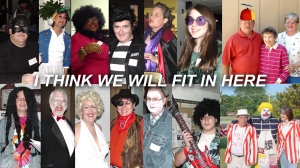 A little over sixteen years ago, November 30th of 2001, we arrived at the United Church of Huntsville. The congregation had been deeply divided. They nearly imploded in early 2000, and then after Interim Pastor Roger Lovette’s persistent preaching to forgive one another, the congregation overcame enough bitterness to issue a call for a new pastor in August of 2001. After the candidating sermon as Beth and Elizabeth and I were driving back to Illinois, I turned to Beth and said, “You know these people at United Church are odd, I think we will fit in here.” With that auspicious comment we began what has turned into a sixteen year ministry.
A little over sixteen years ago, November 30th of 2001, we arrived at the United Church of Huntsville. The congregation had been deeply divided. They nearly imploded in early 2000, and then after Interim Pastor Roger Lovette’s persistent preaching to forgive one another, the congregation overcame enough bitterness to issue a call for a new pastor in August of 2001. After the candidating sermon as Beth and Elizabeth and I were driving back to Illinois, I turned to Beth and said, “You know these people at United Church are odd, I think we will fit in here.” With that auspicious comment we began what has turned into a sixteen year ministry.
SLIDE 4: REMARKABLY CREATIVE CHRISTIAN ED PROGRAM
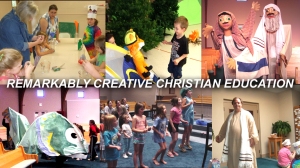 Early on in our time at United Church we had many children and young people in this congregation. We had a remarkably creative Christian Education Program.
Early on in our time at United Church we had many children and young people in this congregation. We had a remarkably creative Christian Education Program.
SLIDE 5: CONFIRMED MANY YOUNG PEOPLE
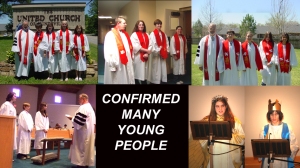 In the spring of 2002 we confirmed a class of four young people: Melissa, Ellen, Abigail and Nathan. Two years later we confirmed another four young people in 2004: Elizabeth, Zach, Damian and Kimberly. We turned around and confirmed four more young people in 2005: John, Madison, C.C. and Robert. Then we had a three year gap and confirmed Zoe, Alexis and Karl in 2008. Finally in 2010 we confirmed Christopher and Elizabeth, and then we had a long dry spell. The Sunday school dwindled. We hardly had enough kids for a one room Sunday school.
In the spring of 2002 we confirmed a class of four young people: Melissa, Ellen, Abigail and Nathan. Two years later we confirmed another four young people in 2004: Elizabeth, Zach, Damian and Kimberly. We turned around and confirmed four more young people in 2005: John, Madison, C.C. and Robert. Then we had a three year gap and confirmed Zoe, Alexis and Karl in 2008. Finally in 2010 we confirmed Christopher and Elizabeth, and then we had a long dry spell. The Sunday school dwindled. We hardly had enough kids for a one room Sunday school.
SLIDE 5: CONFIRMED EVAN AND COLE
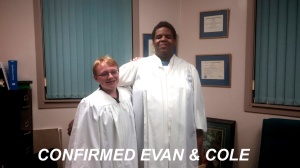 And then this year, we have confirmed Evan and Cole, and received Patrick in membership. We have young children again, and beginning in this January Ruth Votava is restarting the nursery (And Beth and I can’t volunteer). We are also going to split the Sunday school class into children and youth. This congregation has a bright future, if we are willing to work to nurture these children and young people in faith.
And then this year, we have confirmed Evan and Cole, and received Patrick in membership. We have young children again, and beginning in this January Ruth Votava is restarting the nursery (And Beth and I can’t volunteer). We are also going to split the Sunday school class into children and youth. This congregation has a bright future, if we are willing to work to nurture these children and young people in faith.
SLIDE 6: WONDERFUL VACATION BIBLE SCHOOLS
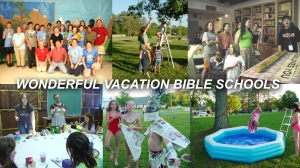 Another part of the story I want to tell is about Vacation Bible School. We had some wonderful VBS programs. Under Leah Christakes’ leadership we experienced the magic, and we utilized our youth in producing a program for our younger children – everyone benefited. I can’t show all the VBS videos, but allow me to share with you the 2009 Vacation Bible School video.
Another part of the story I want to tell is about Vacation Bible School. We had some wonderful VBS programs. Under Leah Christakes’ leadership we experienced the magic, and we utilized our youth in producing a program for our younger children – everyone benefited. I can’t show all the VBS videos, but allow me to share with you the 2009 Vacation Bible School video.
SLIDE 8: ONE WEEK OF VBS EQUALS A SEMESTER OF SS
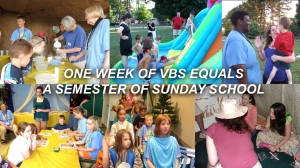 We simply need some adults who are willing to provide leadership and invest some energy in doing something really fun with kids. And don’t allow money to prevent you from putting together the best Bible School you can. Leah did fund raising and people came forward to donate, because they believed in the power of Vacation Bible School. We have more contact hours with kids during a week of Vacation Bible School than we often manage in a semester of Sunday school.
We simply need some adults who are willing to provide leadership and invest some energy in doing something really fun with kids. And don’t allow money to prevent you from putting together the best Bible School you can. Leah did fund raising and people came forward to donate, because they believed in the power of Vacation Bible School. We have more contact hours with kids during a week of Vacation Bible School than we often manage in a semester of Sunday school.
SLIDE 9: VBS WITH ST. STEPHENS LED TO LABYRINTH
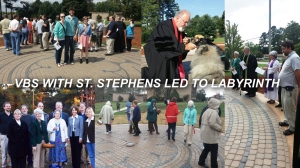 In 2009 we also organized Vacation Bible School with our neighbors next door St. Stephen’s Episcopal Church. And that partnership led to our sharing with St. Stephen’s in building our Healing Steps Labyrinth. Rather than turning in on ourselves and insisting that we weren’t going to share any of our open space, we finally decided to reach out to build a handicapped accessible Labyrinth with our neighboring congregation. When we are willing to cooperate with our neighbors miracles can happen.
In 2009 we also organized Vacation Bible School with our neighbors next door St. Stephen’s Episcopal Church. And that partnership led to our sharing with St. Stephen’s in building our Healing Steps Labyrinth. Rather than turning in on ourselves and insisting that we weren’t going to share any of our open space, we finally decided to reach out to build a handicapped accessible Labyrinth with our neighboring congregation. When we are willing to cooperate with our neighbors miracles can happen.
SLIDE 10: STILL SPEAKING CAMPAIGN
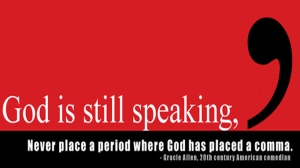 Another important development in the life of United Church came in 2004, when the United Church of Christ began the God Is Still Speaking Campaign. Do you remember the “Bouncers Ad” that kicked it off?
Another important development in the life of United Church came in 2004, when the United Church of Christ began the God Is Still Speaking Campaign. Do you remember the “Bouncers Ad” that kicked it off?
SLIDE 12: BOUNCER PICTURE
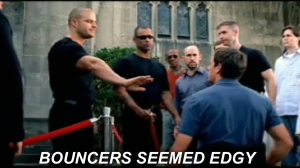 For that time the “Bouncers Ad” seemed a little edgy for some people, but as we began to do some soul searching we realized that United Church wasn’t going to turn anyone away. We really do believe that in the name of Jesus Christ everyone is welcome. And so we began talking about extravagant welcome. We raised some money and aired the Bouncer’s Ad on television and then the “Ejector Ad,” and pretty soon people began showing up.
For that time the “Bouncers Ad” seemed a little edgy for some people, but as we began to do some soul searching we realized that United Church wasn’t going to turn anyone away. We really do believe that in the name of Jesus Christ everyone is welcome. And so we began talking about extravagant welcome. We raised some money and aired the Bouncer’s Ad on television and then the “Ejector Ad,” and pretty soon people began showing up.
We even produced our own commercial that tried to capture the important discriminators that set United Church apart from many other churches.
SLIDE 14: UCH COMMERICAL PICTURE
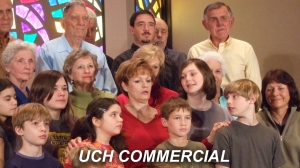 “Your personal faith is respected. Science and faith are not mutually exclusive. You are encouraged to seek your own understanding of the Bible. You are encouraged to live your faith by helping others. No matter who you are or where you are on life’s journey you are welcome here.” And now we can add our faith community is “Open and Affirming.”
“Your personal faith is respected. Science and faith are not mutually exclusive. You are encouraged to seek your own understanding of the Bible. You are encouraged to live your faith by helping others. No matter who you are or where you are on life’s journey you are welcome here.” And now we can add our faith community is “Open and Affirming.”
SLIDE 15: BECOMING OPEN AND AFFIRMING
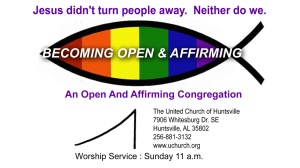 The struggle to finally embrace the Open and Affirming message took a while. Eddie Colf led the Diaconate and Congregation in discussing all the ramifications of declaring our church Open and Affirming. As Bill Green likes to note Eddie did not rush the process. He had the patience to wait until everyone had had an opportunity to express themselves. And in the end the vote was nearly unanimous. We had taken a giant leap forward to embrace equality for all.
The struggle to finally embrace the Open and Affirming message took a while. Eddie Colf led the Diaconate and Congregation in discussing all the ramifications of declaring our church Open and Affirming. As Bill Green likes to note Eddie did not rush the process. He had the patience to wait until everyone had had an opportunity to express themselves. And in the end the vote was nearly unanimous. We had taken a giant leap forward to embrace equality for all.
SLIDE 16: ROUND TABLE ICE GROUP
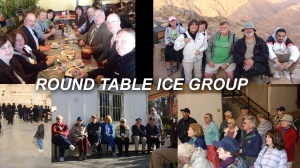 Another important experience for me and United Church over the last 16 years was the Institute for Clergy Excellence. The Round Table ICE group brought us into an experiment in interfaith relationships. Our friendship with Rabbi Jeffrey Ballon promoted cooperation with Temple B’nai Sholom that led to an interfaith journey to Israel in which several of our members participated. When people of faith with good will join hands, even when our faiths are different we can all benefit.
Another important experience for me and United Church over the last 16 years was the Institute for Clergy Excellence. The Round Table ICE group brought us into an experiment in interfaith relationships. Our friendship with Rabbi Jeffrey Ballon promoted cooperation with Temple B’nai Sholom that led to an interfaith journey to Israel in which several of our members participated. When people of faith with good will join hands, even when our faiths are different we can all benefit.
SLIDE 17: BIRMINGHAM 8 AND PATHWAYS TO THE DIVINE
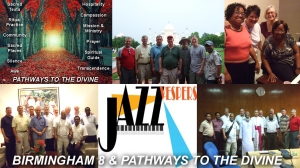 The interfaith ICE Group the Birmingham 8 provided the opportunity for me to travel to Bangladesh and India. As a result of that travel I brought back the twelve interfaith pathways to the divine. And Rose Rushin then used those twelve pathways to organize at United Church a Jazz Vespers Service.
The interfaith ICE Group the Birmingham 8 provided the opportunity for me to travel to Bangladesh and India. As a result of that travel I brought back the twelve interfaith pathways to the divine. And Rose Rushin then used those twelve pathways to organize at United Church a Jazz Vespers Service.
SLIDE 18: MISSION AND SERVICE
 Mission and Service has been an important theme in the life of our congregation over the last sixteen years. We have participated in Habitat for Humanity. Through Sue Duthie our congregation has been an important supporter of Foodline. Through our fifth Sunday Offerings for the Diaconate Fund. We have participated in the Huntsville Assistance Program. Through Rollan Edwards we sent an ambulance to Honduras and supported several ministries in that country. Through Alix Morehouse we have provided assistance and support for the homeless and First Stop. We also faithfully decorate the sock and glove tree to share with our brothers and sisters in the Lakota Association of the South Dakota Conference.
Mission and Service has been an important theme in the life of our congregation over the last sixteen years. We have participated in Habitat for Humanity. Through Sue Duthie our congregation has been an important supporter of Foodline. Through our fifth Sunday Offerings for the Diaconate Fund. We have participated in the Huntsville Assistance Program. Through Rollan Edwards we sent an ambulance to Honduras and supported several ministries in that country. Through Alix Morehouse we have provided assistance and support for the homeless and First Stop. We also faithfully decorate the sock and glove tree to share with our brothers and sisters in the Lakota Association of the South Dakota Conference.
SLIDE 19: RELATIONSHIP WITH SEC & UCC
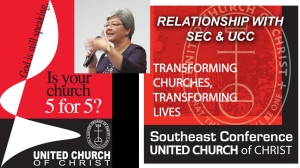 I also want to note that during the last sixteen years we have strengthened our relationship with the Southeast Conference and the United Church of Christ. When I arrived we had members who were openly hostile to the Denomination and the Conference. We have remained a Five for Five Congregation participating in all our of our denominations special offerings. We have also made our relationship to the United Church of Christ a cornerstone of our identity. And I want to thank June Boutwell our Conference Minister for being here today for the liturgy of farewell and release and for the wonderful support she has been giving our congregation as we move into this time of transition.
I also want to note that during the last sixteen years we have strengthened our relationship with the Southeast Conference and the United Church of Christ. When I arrived we had members who were openly hostile to the Denomination and the Conference. We have remained a Five for Five Congregation participating in all our of our denominations special offerings. We have also made our relationship to the United Church of Christ a cornerstone of our identity. And I want to thank June Boutwell our Conference Minister for being here today for the liturgy of farewell and release and for the wonderful support she has been giving our congregation as we move into this time of transition.
SLIDE 20: FAREWELL AND RELEASE
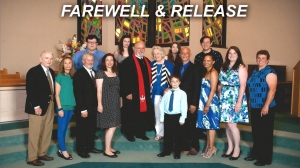 Sixteen years is a long time, and I could go on and on. But I think we need to wrap this up. When we come to the Liturgy of Farewell and Release, I want to ask Beth and the rest of my family present to come forward to stand with me. The life of a minister is difficult, and the life of the clergy family is also tough. So I want to thank my family for standing by me during these sixteen years. I could not have done it without you.
Sixteen years is a long time, and I could go on and on. But I think we need to wrap this up. When we come to the Liturgy of Farewell and Release, I want to ask Beth and the rest of my family present to come forward to stand with me. The life of a minister is difficult, and the life of the clergy family is also tough. So I want to thank my family for standing by me during these sixteen years. I could not have done it without you.
SLIDE 21: ENDINGS ALWAYS HAVE MIXED FEELINGS
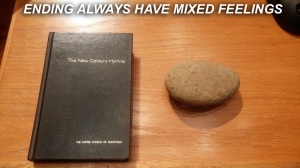 Some people have asked me, “How do I feel?” Endings always have mixed feelings, but more than anything else right now the feeling on top is relief. I have struggled over the past two years with arthritis and now four surgeries three of them in the past year. Trying to keep up has been hard, and I thank the congregation for all of your patience as I have struggled to make it to this final Sunday. Fifteen months ago United Church and St. Stephen’s held a training session about our new Labyrinth. During one of the exercises we were asked to carry a stone as we walked the Labyrinth to symbolize our burdens. I realized that I could not lay that stone down until today. I have kept my stone here in the pulpit. After our celebration today, I will walk the Labyrinth once again, and lay my burden down in the center.
Some people have asked me, “How do I feel?” Endings always have mixed feelings, but more than anything else right now the feeling on top is relief. I have struggled over the past two years with arthritis and now four surgeries three of them in the past year. Trying to keep up has been hard, and I thank the congregation for all of your patience as I have struggled to make it to this final Sunday. Fifteen months ago United Church and St. Stephen’s held a training session about our new Labyrinth. During one of the exercises we were asked to carry a stone as we walked the Labyrinth to symbolize our burdens. I realized that I could not lay that stone down until today. I have kept my stone here in the pulpit. After our celebration today, I will walk the Labyrinth once again, and lay my burden down in the center.
SLIDE 22: IT IS TIME
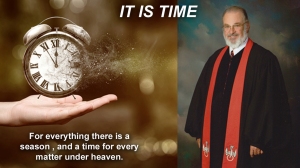 Like most retirees I will no doubt experience feelings of loss and grief, but right now I feel relief. Thank you for these last sixteen years. As the sermon title implies it is time. It is time.
Like most retirees I will no doubt experience feelings of loss and grief, but right now I feel relief. Thank you for these last sixteen years. As the sermon title implies it is time. It is time.
Rabbi Nachmani — An Original Christmas Story
Posted: December 25, 2016 Filed under: Uncategorized Leave a commentRabbi Nachmani
Scene One —
Refugees are everywhere. They come without a denarius in their pockets and just the clothes on their backs. They come from Judea fleeing the evil and murderous regime of King Herod, who is so paranoid he kills his subjects without even a hint of evidence of disloyalty. And so they undertake the dangerous crossing of the desert and come filling the streets of Alexandria looking for work, looking for places to stay and something to eat. And where do they come? The synagogue of course. They say, “We are Jews, a little charity please?” And my people and I are all out of charity.
I am Rabbi Nachmani, the leader of a small synagogue here in Alexandria. Of course with a population of half a million Jews Alexandria has many synagogues. In fact there are more Jews living in our City than in all of Herod’s Kingdom. It’s amazing at the rate he kills his own people, there are any Jews left in Israel.
Now Herod never was much of a Jew. His ancestors were Idumeans, and his father Faisal, changed his religion for political advantage with the Romans. Israel has been a mess for a long time. No, Herod is more a Roman than a Jew, and that is why the Roman Senate in their infinite wisdom appointed him as King of the Jews. My great-grandparents blessed be their memory came to Alexandria 50 years ago to escape from the chaos of the administration of Faisal, Herod’s father.
So my great-grandparents came and made a home here in Egypt. My grandfather was a carpenter, and my father was a carpenter, and I too am a wood worker, and the rabbi for our small synagogue of the wood cutters. Mind you a rabbi is not a preacher. Sometimes I lead the prayers, but more often the scriptures are read by members of the congregation and the prayers are often sung by Daniel ben Sirach who is our congregational song leader. No, mostly I help negotiate marriage contracts, preside at weddings, perform the bris, provide interpretations of the law, distribute charity and occasionally mediate disputes.
Like the other day Moishe sold a cow to Joshua ben Israel. A month after the sale the cow stopped giving milk. Joshua wanted his money back. So, they brought their dispute to me. “Moishe,” I asked, “did you know your cow was going to stop giving milk?”
“Of course not Rabbi,” replied Moishe.
“But Rabbi,” objected Joshua, “how could he have not known?”
“But why do you say that?” I asked Joshua.
“Because he did not breed the cow before he sold it to me!”
“But I didn’t know the cow was due to be bred,” protested Moishe.
“Alright already! Moishe,” I said, ” you take the cow back and breed it with your bull. Then give the cow back to Joshua, and then let God decide if the cow will give milk.”
Moishe and Joshua agreed to this decision, because it is always better to trust your disputes to the synagogue than the Egyptian courts. We always try to keep the Egyptians out of our affairs. The hardest part of my job is distributing charity, especially with all of the refugees flooding in from Judea. The established members of our community, the families who have been here for generations expect that they should receive priority in the distribution of charity and not the newcomers. And so the refugees are a pain in the neck. And we also fear some of them. Among the poor who are trying to escape from Herod’s murderous ways there are also zealots who want to stir up trouble.
The zealots hate Rome and they try to inflame rebellion wherever they go. And our community here in Alexandria does not want trouble with the Romans or the Egyptians. We have established a reasonably comfortable life here, the authorities by and large leave us alone, and we don’t want outside agitators inciting hostility against our Jewish community.
So as Rabbi of the synagogue I am careful even dubious of welcoming refugees from Judea into our community. But sometimes even when we are cautious because we are afraid we need to be open to what God might be doing right underneath our noses. Let me tell you about a recent family, who arrived from Bethlehem about two years ago. But first I hear my wife Elisheva calling. You stay here in my shop and I will come back after I find out what she wants.
Scene Two –
Another family asking the Rabbi’s wife for help. Sometimes they think if they ask the Rebbetzin for help, she will be more generous. And maybe they are right. Anyway I was going to tell you about a family who arrived two years ago now from Bethlehem. They came across the desert in winter. They came very afraid seeking a place to hide. The husband Joseph was a carpenter. So out of loyalty to my own craft I welcomed him. My friend Ephraim was looking for a helper and I arranged for Joseph to go to work for him. The wife, Mary was very young, suckling her first child, a boy named Yeshua, a form of Joshua, meaning deliverer. When I asked Joseph why they were fleeing from Judea he had the most fantastic story.
He said when he had been betrothed to Mary for a few months she showed up pregnant even though he had not touched her yet. He said he had considered divorcing her quietly but an angel told him in a dream the child was special, and he was supposed to name the baby Emmanuel from the prophet Isaiah meaning God with us. Well there is no fool like an old fool I guess, and if everyone believed their dreams where would we be?
But then he had the most bizarre story about Magi astrologers from Babylon who came to Jerusalem asking where the messiah was to be born. They said, they had read the signs in the heavens, and a star had appeared in the sky announcing the birth of a new world ruler, who would be born in Israel. Supposedly Herod granted them an audience and even summoned the high priests to advise him about where the messiah was to be born. “In Bethlehem,” they said. So, Herod told the Magi to go and search for the child and if they found him to bring back word to the King.
A short time later, the three Magi surprised Joseph, Mary and the child in Bethlehem and presented to them princely gifts, gold frankincense and myrrh. But then the Magi told Joseph they had been warmed by an angel in a dream not to go back to Herod, because the King would seek out the child to destroy him. News even reached Alexandria that the murderous Herod had sent soldiers to Bethlehem to slaughter all male children under the age of two.
So having been warned by the Magi, Joseph packed up his family and set out for Alexandria. The little family could not wait for a caravan and crossing the Sinai alone is a dangerous journey. They were accosted by Bedouins who stole the gifts of the Magi. So Joseph and his family arrived in Alexandria penniless. Elisheva found herself instantly attracted to the Baby Jesus and offered Mary comfort and even found money in her household budget to provide food for the little family. There is something special about Yeshua. Oh, he is as mischievous as any other two year old, but there is a peace that seems to surround him as he follows his mother to the market or comes to visit my wife Elisheva.
I might have doubted Joseph’s story about Herod seeking the life of the child, but about six months after the family arrived, I heard news that strangers from Judea were in Alexandria asking about refugees from Bethlehem. I went to Joseph and warned him that his family needed to keep a low profile, and invited Mary, Joseph and the child to come stay with us, and we would pretend that Joseph was my cousin, who was working in my shop. My house is not large, but we managed to fit Joseph and his family by sending three of my children to live with their grandparents for several weeks. And sure enough the “strangers” came to the synagogue of the wood cutters looking for refugees.
They were evil looking men. “Are you harboring any recent arrivals from Bethlehem?” their leader asked.
“No,” I replied, “the members of this synagogue have lived in Alexandria for generations. My great-grandparents came here 50 years ago.”
“What about him?” the leader asked pointing to Joseph.
“He is my cousin Joseph, we were both born here in Alexandria. We don’t like new comers. They take our jobs. We want to keep them out. You won’t find any of them here!”
“Then you won’t mind telling us if you see or hear of any arrivals from Bethlehem,” concluded their leader.
“That’s right I confirmed. You won’t find any new comers here. We don’t want’em.” With that Herod’s spies left my work shop. Just to be safe Joseph, Mary and the child stayed at our house for several more weeks.
Excuse me, Elisheva, is calling for me. I will come back as soon as I can.
Scene Three –
My wife needs that I should find a lamb for the Passover Meal. Seems funny for Jews living in Egypt to celebrate the Passover – the Exodus. But it is our tradition. Anyway after the visit from Herod’s spies I was more inclined to believe Joseph’s account of their leaving Bethlehem. But I still harbored some doubts until two weeks ago when during a restless night I had a dream.
In the dream an angel came to me. But it seemed more like real life than a dream. The angel was tall radiating light from giant wings of translucent feathers. I stood still with my mouth open in awe and fear. The heavenly being stared at me for a full minute as if waiting for me to speak, but no sound came out of my mouth. Then in a deep commanding voice the angel said, “Do not be afraid Nachmani. I am Gabriel, who stand in the presence of God. I bring you good news. Herod is dead. You must go tell Joseph, he can return with his wife and child to Israel, for now no harm will come to the child. And this will fulfill what has been spoken by the prophet Hosea, “Out of Egypt I have called my son.” When the angel went away, I awoke wondering if what I had seen had been in waking life or a dream. The angel seemed so real. I can still remember the commanding voice. I doubt I shall ever be so close to the divine again.
The next morning I sought out Joseph to share with him the message of the angel. “Joseph, my brother, forgive me for ever doubting your story. Last night an angel came to visit me. He told me that Herod is dead and you and Mary and the child can return to Israel to fulfill the prophecy, for there is no one now to seek the life of the child.”
“But how can I be sure?” asked Joseph.
So I described the angel that appeared to me: “tall, large translucent wings.”
“Did the messenger say its name was Gabriel?”
“Yes, he did, ‘I am Gabriel who stand in the presence of God,’ he said.”
“It is a wondrous thing,” Joseph said, just like the angel I told you appeared to me.”
“My friend,” I replied, “I am so sorry I ever doubted you. Through your child Yeshua, we have been touched by heaven.”
Our poor synagogue could not duplicate the gifts of the Magi, but David, Gamaliel, Ephraim, Jacob and I gathered what little money we could to send the little family back across the desert to Israel. I tell you my friends, we have been touched by God. And I have learned, do not begrudge charity to the poor, especially those who are homeless or fleeing from injustice. God is often working miracles right underneath our noses, and the messiah is always closer than we think.
God within Us
Posted: December 18, 2016 Filed under: Uncategorized Leave a commentGod with Us
SLIDE 3: EMMANUEL – GOD IS WITH US
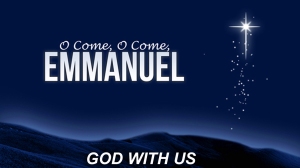 In the Gospel of Matthew the angel who visits Joseph in a dream to encourage him to go ahead and marry his pregnant fiancée tells him to name the child Yeshua which meant deliverer or Messiah. Matthew claims that the birth of Yeshua will fulfil the prophecy in Isaiah 7:14 — “’the virgin shall conceive and bear a son, and they shall name him Emmanuel’, which means, ‘God is with us.’”
In the Gospel of Matthew the angel who visits Joseph in a dream to encourage him to go ahead and marry his pregnant fiancée tells him to name the child Yeshua which meant deliverer or Messiah. Matthew claims that the birth of Yeshua will fulfil the prophecy in Isaiah 7:14 — “’the virgin shall conceive and bear a son, and they shall name him Emmanuel’, which means, ‘God is with us.’”
SLIDE 4: HOLY FAMILY BECAME REFUGEES
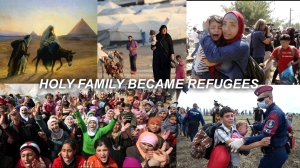 During the Christmas Season we celebrate the incarnation of God appearing in the world in the form of a baby born in a cave to poor peasants and laid in a manger, a feed trough for animals, because there was no room in the inn. We also remember especially at this Christmas that Jesus and his family became refugees, forced to flee for their lives from the soldiers of the murderous King Herod. They left the land of Israel and traveled across desert borders until they found a place to stay in Egypt. The Holy Family was not unlike people today, who have been uprooted from their homes and forced to seek asylum in other far countries, because they are being killed by their own governments. The story of the Christ child reminds us that God often shows up in unlikely places in the lives of people we might never consider to be holy. After all who would think to look for God in the form of a suffering and dying political criminal nailed to a cross!
During the Christmas Season we celebrate the incarnation of God appearing in the world in the form of a baby born in a cave to poor peasants and laid in a manger, a feed trough for animals, because there was no room in the inn. We also remember especially at this Christmas that Jesus and his family became refugees, forced to flee for their lives from the soldiers of the murderous King Herod. They left the land of Israel and traveled across desert borders until they found a place to stay in Egypt. The Holy Family was not unlike people today, who have been uprooted from their homes and forced to seek asylum in other far countries, because they are being killed by their own governments. The story of the Christ child reminds us that God often shows up in unlikely places in the lives of people we might never consider to be holy. After all who would think to look for God in the form of a suffering and dying political criminal nailed to a cross!
SLIDE 5: WHEREVER YOU FIND PEOPLE IN NEED
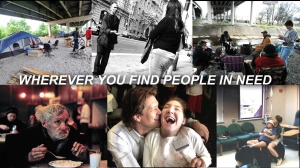 Maybe we miss God’s presence in our world today because we are not prepared to find God in unusual circumstances. Instead of going to the stores with the lights and the tinsel, or the living Christmas Tree, or even the candlelight Christmas Eve Communion, maybe we need to take food to the homeless camps. Or perhaps we can find a poor family whose utilities have been turned off, or a child who has no gifts and needs a warm coat. Perhaps we can help a family struggling to make Christmas Dinner, or reach out to an older person who is spending Christmas alone, or brighten the life of someone struggling with depression with a gesture of friendship. Jesus told us wherever you find people in need you will find me!
Maybe we miss God’s presence in our world today because we are not prepared to find God in unusual circumstances. Instead of going to the stores with the lights and the tinsel, or the living Christmas Tree, or even the candlelight Christmas Eve Communion, maybe we need to take food to the homeless camps. Or perhaps we can find a poor family whose utilities have been turned off, or a child who has no gifts and needs a warm coat. Perhaps we can help a family struggling to make Christmas Dinner, or reach out to an older person who is spending Christmas alone, or brighten the life of someone struggling with depression with a gesture of friendship. Jesus told us wherever you find people in need you will find me!
SLIDE 6: WE DON’T GET TO DECIDE WHO GOD WILL BRING
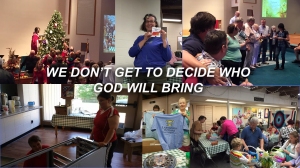 God is indeed with us, if we are willing to recognize and acknowledge the divine presence in the poor and other people in need. But we often resist seeing God in the needs of others, because they might make a claim upon us. They are dirty, smelly, difficult or just plain messy, physically, emotionally, spiritually. They come to us in the midst of nervous break-down, divorce, sometimes even with legal and criminal problems. When we open the doors of our spiritual community and proclaim no matter who you are or where you are on life’s journey you are welcome here, then God brings people of all kinds, and we don’t get to choose what sorts of problems they will bring with them. We don’t get to say, “Lord send us some nice middle-class neurotics with plenty of money to support the church budget. God, please don’t send us anyone whose needs offend us.” No, God brings folks who are not like us. People we have to learn to love, and that is the challenge of living together as a diverse Body of Christ.
God is indeed with us, if we are willing to recognize and acknowledge the divine presence in the poor and other people in need. But we often resist seeing God in the needs of others, because they might make a claim upon us. They are dirty, smelly, difficult or just plain messy, physically, emotionally, spiritually. They come to us in the midst of nervous break-down, divorce, sometimes even with legal and criminal problems. When we open the doors of our spiritual community and proclaim no matter who you are or where you are on life’s journey you are welcome here, then God brings people of all kinds, and we don’t get to choose what sorts of problems they will bring with them. We don’t get to say, “Lord send us some nice middle-class neurotics with plenty of money to support the church budget. God, please don’t send us anyone whose needs offend us.” No, God brings folks who are not like us. People we have to learn to love, and that is the challenge of living together as a diverse Body of Christ.
SLIDE 7: NAMASTE
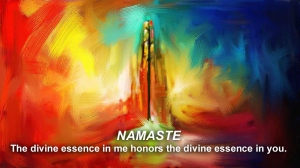 So, as we hear the Christmas story tell us that God is with us, I want us also to hear that God is within us. The Hindu salutation “Namaste” means the divine in me acknowledges and greets the divine in you. When we learn to see the divine in other people who are different from us we discover the meaning of the God within us in spiritual community. And as we know acknowledging the divine in people who are very different from us, whether because of race, social class, gender, or sexual orientation, can be difficult.
So, as we hear the Christmas story tell us that God is with us, I want us also to hear that God is within us. The Hindu salutation “Namaste” means the divine in me acknowledges and greets the divine in you. When we learn to see the divine in other people who are different from us we discover the meaning of the God within us in spiritual community. And as we know acknowledging the divine in people who are very different from us, whether because of race, social class, gender, or sexual orientation, can be difficult.
SLIDE 8: GOD CANNOT BE DEPICTED WITH IMAGES
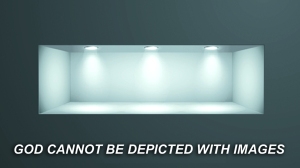 Our human species tends to be tribal. We are attracted to people who are like us, and folks who look different, act different, eat different, vote different or believe differently may engender in us fear and hostility. The God who is within us comes in all shapes, sizes, colors, genders, and sexual orientations. The God within us cannot be depicted with any images, because the God of Abraham, Isaac, Jacob, David, Jesus, Mohammed, Buddha, Krishna, or Guru Nanak, transcends all nationalities, races, colors, cultures, religions, even political parties. The God of our faith seeks to open us to all other people in love, even when we think they are stupid and don’t like them very much. God is with us in the God within us.
Our human species tends to be tribal. We are attracted to people who are like us, and folks who look different, act different, eat different, vote different or believe differently may engender in us fear and hostility. The God who is within us comes in all shapes, sizes, colors, genders, and sexual orientations. The God within us cannot be depicted with any images, because the God of Abraham, Isaac, Jacob, David, Jesus, Mohammed, Buddha, Krishna, or Guru Nanak, transcends all nationalities, races, colors, cultures, religions, even political parties. The God of our faith seeks to open us to all other people in love, even when we think they are stupid and don’t like them very much. God is with us in the God within us.
SLIDE 9: ABSORB TOO MUCH NEGATIVE ENERGY
 But where do we find the strength to sustain us through the spiritual darkness that even now seems to be gathering around us? There is another way that God is within us as we literally connect with the God within our own spirits. Sometimes we are blocked from that connection, because we have absorbed too much negative energy from the world around us. The world tells us we are stupid, immature, weird, odd, strange, queer, not regular or unacceptable people. And that negative energy prevents us from being able to identify the divine image within us. And when we cannot recognize the God within us we cannot connect with the divine energy that gives us the power to love others in a way that can change the world.
But where do we find the strength to sustain us through the spiritual darkness that even now seems to be gathering around us? There is another way that God is within us as we literally connect with the God within our own spirits. Sometimes we are blocked from that connection, because we have absorbed too much negative energy from the world around us. The world tells us we are stupid, immature, weird, odd, strange, queer, not regular or unacceptable people. And that negative energy prevents us from being able to identify the divine image within us. And when we cannot recognize the God within us we cannot connect with the divine energy that gives us the power to love others in a way that can change the world.
SLIDE 10: NAME OF GOD IS THE SOUND OF OUR BREATHING
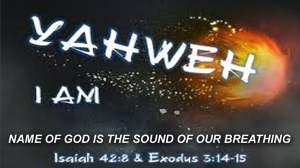 In order to connect with the God within us we also need to learn to stop, breath, and be still long enough to be aware of God’s presence within us, within others, and all around us. Our breath as we say when we pray is our closest connection to the divine. As one Zen Master pointed out, “Breathe in, breathe out. Breathe in, breathe out. Forget this and attaining enlightenment will be the least of your problems.” The wind, the breath of God hovered over the waters of chaos when God spoke and brought forth the creation. The name of God, Yaweh, is actually the sound of our own breathing. God is as close to us as breathing and as distant as the farthest star.
In order to connect with the God within us we also need to learn to stop, breath, and be still long enough to be aware of God’s presence within us, within others, and all around us. Our breath as we say when we pray is our closest connection to the divine. As one Zen Master pointed out, “Breathe in, breathe out. Breathe in, breathe out. Forget this and attaining enlightenment will be the least of your problems.” The wind, the breath of God hovered over the waters of chaos when God spoke and brought forth the creation. The name of God, Yaweh, is actually the sound of our own breathing. God is as close to us as breathing and as distant as the farthest star.
SLIDE 11: PAYING ATTENTION
 As Rabbi Lawrence Kushner points out in God Was in this Place, and I, i Did Not Know: “The ‘burning bush’ was not a miracle. It was a test. God wanted to find out whether or not Moses could pay attention to something for more than a few minutes. When Moses did, God spoke. The trick is to pay attention to what is going on around you long enough to behold the miracle without falling asleep. There is another world, right here within this one, whenever we pay attention.” And so, if we are to find that divine presence within us and around us, we have to learn to pay attention, to follow our breath until we merge with the God who is the ground of our being.
As Rabbi Lawrence Kushner points out in God Was in this Place, and I, i Did Not Know: “The ‘burning bush’ was not a miracle. It was a test. God wanted to find out whether or not Moses could pay attention to something for more than a few minutes. When Moses did, God spoke. The trick is to pay attention to what is going on around you long enough to behold the miracle without falling asleep. There is another world, right here within this one, whenever we pay attention.” And so, if we are to find that divine presence within us and around us, we have to learn to pay attention, to follow our breath until we merge with the God who is the ground of our being.
SLIDE 12: AWAKENING US TO BECOME CHRISTLIKE
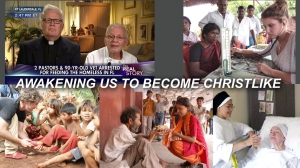 Rami Shapiro, in his book, Perennial Wisdom for the Spiritually Independent, helps us to understand how the Advent of Christ in the story of Jesus can help us find the God within us. “The purpose of the Christ isn’t to raise up followers. The purpose of the Jesus is to awaken more people to become more Christ-like.
Rami Shapiro, in his book, Perennial Wisdom for the Spiritually Independent, helps us to understand how the Advent of Christ in the story of Jesus can help us find the God within us. “The purpose of the Christ isn’t to raise up followers. The purpose of the Jesus is to awaken more people to become more Christ-like.
Rather than the vertical idea of Jesus ‘coming down’ from heaven and ‘rising up’ to heaven, a metaphor that implies a hierarchy lacking in the Divine, think in terms of ‘reaching out’ and ‘drawing in.’ The wise reach out from the divine Source and bring you back to the Source.
There are two ways to become divine. The right way is to realize that God is playing you. The wrong way is to fool yourself into playing God. The task of Jesus and all the realized saints and sages is the same: to awaken you to your true nature that you might participate fully in the nature of the world.”
SLIDE 13: YOU ARE THE LIGHT OF THE WORLD
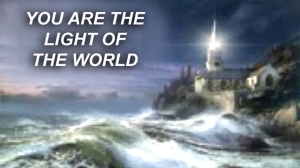 And so, it is our prayer this Advent that the Christ might reach out to us and draw us in to the source of the divine light. As Jesus said in his sermon on the Mount: “You are here to be light, bringing out the God-colors in the world. God is not a secret to be kept. We’re going public with this, as public as a city set on a hill. If I make you light-bearers, you don’t think I’m going to hide you under a bucket, do you? I’m putting you on a light stand. Now that I’ve put you there on a hilltop, on a light stand—shine! Keep open house; be generous with your lives. By reaching out to others and drawing them into the source, you’ll prompt people to come home to God.”
And so, it is our prayer this Advent that the Christ might reach out to us and draw us in to the source of the divine light. As Jesus said in his sermon on the Mount: “You are here to be light, bringing out the God-colors in the world. God is not a secret to be kept. We’re going public with this, as public as a city set on a hill. If I make you light-bearers, you don’t think I’m going to hide you under a bucket, do you? I’m putting you on a light stand. Now that I’ve put you there on a hilltop, on a light stand—shine! Keep open house; be generous with your lives. By reaching out to others and drawing them into the source, you’ll prompt people to come home to God.”
SLIDE 14: GOD WITH US
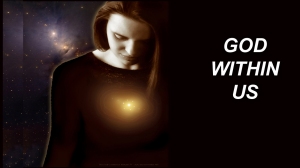 This Christmas season we need to let the light of Christ shine forth from our lives. We can reach out to the needs of others with charity and love. Then Christ can help us to realize the God within us even as the angel promised – God with us.
This Christmas season we need to let the light of Christ shine forth from our lives. We can reach out to the needs of others with charity and love. Then Christ can help us to realize the God within us even as the angel promised – God with us.
Vision of Peace
Posted: December 4, 2016 Filed under: Uncategorized Leave a commentVision of Peace
SLIDE 5: NETZER
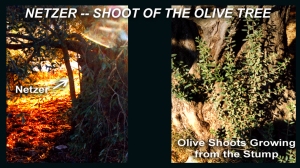 Our scripture this morning is perhaps the most beloved of all the prophetic passages the early church claimed to apply to Jesus. New growth shall come out from the stump of Jesse. A descendant of the line of King David will emerge in the future. The Hebrew in that passage refers to a netzer, which applies to the new shoots that come up from the root system of an olive tree. The olive trees in the garden of Gethsemane, for instance, are the great grandchildren of the trees that were there, when Jesus prayed, because they have replenished themselves from the root systems for over two-thousand years. The early church latched onto that word “netzer,” because the Jewish clan that settled Nazareth, when they returned from Babylon called themselves the “Netzer” clan. They had a self conscious belief in our scripture from Isaiah that from their family the descendant of David who would become God’s Messiah would spring up like the shoot of an olive from the root system. So Jesus of Nazareth was also Jesus the Netzorean, or “God with us” from the Clan of Netzer.
Our scripture this morning is perhaps the most beloved of all the prophetic passages the early church claimed to apply to Jesus. New growth shall come out from the stump of Jesse. A descendant of the line of King David will emerge in the future. The Hebrew in that passage refers to a netzer, which applies to the new shoots that come up from the root system of an olive tree. The olive trees in the garden of Gethsemane, for instance, are the great grandchildren of the trees that were there, when Jesus prayed, because they have replenished themselves from the root systems for over two-thousand years. The early church latched onto that word “netzer,” because the Jewish clan that settled Nazareth, when they returned from Babylon called themselves the “Netzer” clan. They had a self conscious belief in our scripture from Isaiah that from their family the descendant of David who would become God’s Messiah would spring up like the shoot of an olive from the root system. So Jesus of Nazareth was also Jesus the Netzorean, or “God with us” from the Clan of Netzer.
SLIDE 6: NON-VIOLENT JESUS VS POWER OF ROME
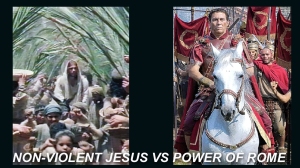 Isaiah’s vision was a leader who would bring peace to the world, and this paralleled the claims the early church wanted to make for Jesus over against Augustus Caesar, whom the Romans asserted had brought peace to the world, through the power of Roman armies, who crushed all opposition. Perhaps you remember from your study of World History the term the Pax Romana, or the Roman Peace, that prevailed, because of the armies of Rome. The problem with the Pax Romana was that it was maintained with the brutal suppression of the national aspirations of all minorities within the Empire. Three Jewish rebellions were crushed during that Pax Romana, until Jerusalem was utterly destroyed, and most Jews deported and scattered throughout the empire, and the land of Israel was even renamed Palestine. The early church wanted to declare that Jesus was a different kind of Prince of Peace, for he brought peace not with the sword but with love.
Isaiah’s vision was a leader who would bring peace to the world, and this paralleled the claims the early church wanted to make for Jesus over against Augustus Caesar, whom the Romans asserted had brought peace to the world, through the power of Roman armies, who crushed all opposition. Perhaps you remember from your study of World History the term the Pax Romana, or the Roman Peace, that prevailed, because of the armies of Rome. The problem with the Pax Romana was that it was maintained with the brutal suppression of the national aspirations of all minorities within the Empire. Three Jewish rebellions were crushed during that Pax Romana, until Jerusalem was utterly destroyed, and most Jews deported and scattered throughout the empire, and the land of Israel was even renamed Palestine. The early church wanted to declare that Jesus was a different kind of Prince of Peace, for he brought peace not with the sword but with love.
SLIDE 7: PEACE ON EARTH TO ALL PEOPLE WITH WHOM GOD IS PLEASED
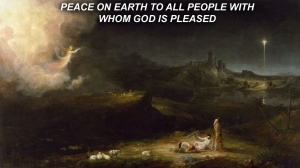 And I guess today we are once again being asked to consider what kind of peace we will work toward as followers of Jesus. In the Christmas story the angels sing to the shepherds: “Glory to God in the highest and peace on earth to all people with whom God is pleased.” The angels may have been singing a loaded message. Was God pleased with Caesar Augustus? Was the Pax Romana the kind of peace God had in mind? I think not, and as citizens of the most powerful military nation on earth, maybe that realization should make us stop and consider our faith.
And I guess today we are once again being asked to consider what kind of peace we will work toward as followers of Jesus. In the Christmas story the angels sing to the shepherds: “Glory to God in the highest and peace on earth to all people with whom God is pleased.” The angels may have been singing a loaded message. Was God pleased with Caesar Augustus? Was the Pax Romana the kind of peace God had in mind? I think not, and as citizens of the most powerful military nation on earth, maybe that realization should make us stop and consider our faith.
SLIDE 8: PAX AMERICANA
 During the Bush administration there was a group of advisors who talked about the Pax Americana. They advocated that the United States was the 800 pound gorilla on the world stage, and we should use that power to maintain a peace favorable to our national interest. Certainly the United States still possesses the most powerful military on earth, but what kind of peace has that bought us? The wars in Iraq and Afghanistan are now the longest wars in which the United States has ever engaged, and are we any closer to peace?
During the Bush administration there was a group of advisors who talked about the Pax Americana. They advocated that the United States was the 800 pound gorilla on the world stage, and we should use that power to maintain a peace favorable to our national interest. Certainly the United States still possesses the most powerful military on earth, but what kind of peace has that bought us? The wars in Iraq and Afghanistan are now the longest wars in which the United States has ever engaged, and are we any closer to peace?
SLIDE 9: TWISTED INTO SOMETHING EVIL
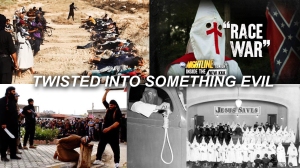 Isis is certainly a deplorable enemy, and personally I see no alternative but to resist Isis militarily. I do not believe they represent Islam as a whole. Isis has taken the Islamic faith and twisted it into something evil, in much the same way the Klu Klux Klan has taken the Christian faith and twisted it into something evil. I don’t think with either Isis or the Klu Klux Klan it is possible to ask everyone to all join hands and sing Kum Ba Yah.
Isis is certainly a deplorable enemy, and personally I see no alternative but to resist Isis militarily. I do not believe they represent Islam as a whole. Isis has taken the Islamic faith and twisted it into something evil, in much the same way the Klu Klux Klan has taken the Christian faith and twisted it into something evil. I don’t think with either Isis or the Klu Klux Klan it is possible to ask everyone to all join hands and sing Kum Ba Yah.
SLIDE 10: THOSE WHO SOW THE WIND WILL REAP THE WHIRL WIND
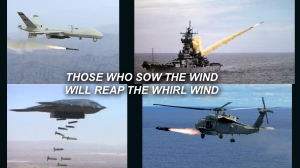 And yet, if I am truly honest in examining and unraveling the complicated history of the involvement of the United States in the Middle East, I have to admit in so many ways the actions of the CIA and our foreign policies driven by our need to protect our national interests in fossil fuels have laid the ground work for the violence in the Middle East. Those who sow the wind will reap the whirl wind. Will “bombing the hell out of Isis” prevent the spread of radical Islamic ideas to millions of dispossessed young people, who are ripe for radicalization? Former Prime Minister of Great Britain, Tony Blair, said in a report entitled, “Inside the Jihadi Mind,” for the Centre on Religion and Geopolitics: The “perversion of Islam is the source of many of the problems in the Middle East,” and more than force is needed to tackle extremism. “The reality is that in parts of the Muslim community a discourse has grown up which is profoundly hostile to peaceful coexistence. Countering this is an essential part of fighting extremism.”
And yet, if I am truly honest in examining and unraveling the complicated history of the involvement of the United States in the Middle East, I have to admit in so many ways the actions of the CIA and our foreign policies driven by our need to protect our national interests in fossil fuels have laid the ground work for the violence in the Middle East. Those who sow the wind will reap the whirl wind. Will “bombing the hell out of Isis” prevent the spread of radical Islamic ideas to millions of dispossessed young people, who are ripe for radicalization? Former Prime Minister of Great Britain, Tony Blair, said in a report entitled, “Inside the Jihadi Mind,” for the Centre on Religion and Geopolitics: The “perversion of Islam is the source of many of the problems in the Middle East,” and more than force is needed to tackle extremism. “The reality is that in parts of the Muslim community a discourse has grown up which is profoundly hostile to peaceful coexistence. Countering this is an essential part of fighting extremism.”
SLIDE 11: HAS AN AGRESSIVE MILITARY POSTURE MADE US SAFER OR MORE VULNERABLE?
 I understand the fear of radical Islam that motivates so many people to seek a leader who will promise them safety. But has an aggressive military posture made us safer or more vulnerable? The invasion of Iraq, for instance, contributed to the radicalization millions of people in the Middle East and created a vacuum that made possible the rise of Isis. Are we really safer for following a tough aggressive military policy? I think Jesus would tell us there must be another way, the way of peace: “But with righteousness the Messiah shall advocate for the poor, and decide with equity for the meek of the earth. ” I know the old phrase from the musical Camelot: “It’s not the earth the meek inherit but the dirt.” But Jesus said, “Blessed are the meek for they shall inherit the earth.”
I understand the fear of radical Islam that motivates so many people to seek a leader who will promise them safety. But has an aggressive military posture made us safer or more vulnerable? The invasion of Iraq, for instance, contributed to the radicalization millions of people in the Middle East and created a vacuum that made possible the rise of Isis. Are we really safer for following a tough aggressive military policy? I think Jesus would tell us there must be another way, the way of peace: “But with righteousness the Messiah shall advocate for the poor, and decide with equity for the meek of the earth. ” I know the old phrase from the musical Camelot: “It’s not the earth the meek inherit but the dirt.” But Jesus said, “Blessed are the meek for they shall inherit the earth.”
SLIDE 12: HOW LONG OH LORD?
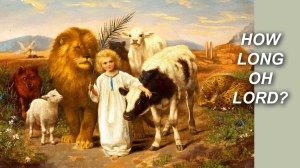 So how long must we wait for the Day of the Lord, when he wolf shall live with the lamb, the leopard shall lie down with the kid, the calf and the lion and the fatling together, and a little child shall lead them? Is the way of Jesus a ridiculous fantasy, or is the way of peace simply waiting for a people of faith who are willing to live it?
So how long must we wait for the Day of the Lord, when he wolf shall live with the lamb, the leopard shall lie down with the kid, the calf and the lion and the fatling together, and a little child shall lead them? Is the way of Jesus a ridiculous fantasy, or is the way of peace simply waiting for a people of faith who are willing to live it?
SLIDE 13: BLACK ELK SPEAKS
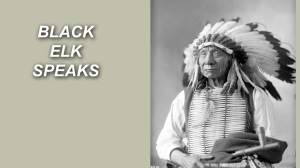 Perhaps Chief Black Elk of the Oglala Lakota Sioux born in 1863 survivor of Wounded Knee and author of Black Elk Speaks in 1932 offers us some wisdom. It is particularly appropriate to listen to Black Elk the Sunday after our Sock and Glove Tree. “The first peace, which is the most important, is that which comes within the souls of people when they realize their relationship, their oneness with the universe and all its powers, and when they realize that at the center of the universe dwells the Great Spirit, and that this center is really everywhere, it is within each of us.” We begin the way of peace by embracing all people as part of ourselves — “loving or neighbors as ourselves.” The artificial walls of race, religion, class and tribe we erect to exclude, separate and create conflict, when we dismantle those walls that separate us one from another, then we are on the path of peace.
Perhaps Chief Black Elk of the Oglala Lakota Sioux born in 1863 survivor of Wounded Knee and author of Black Elk Speaks in 1932 offers us some wisdom. It is particularly appropriate to listen to Black Elk the Sunday after our Sock and Glove Tree. “The first peace, which is the most important, is that which comes within the souls of people when they realize their relationship, their oneness with the universe and all its powers, and when they realize that at the center of the universe dwells the Great Spirit, and that this center is really everywhere, it is within each of us.” We begin the way of peace by embracing all people as part of ourselves — “loving or neighbors as ourselves.” The artificial walls of race, religion, class and tribe we erect to exclude, separate and create conflict, when we dismantle those walls that separate us one from another, then we are on the path of peace.
SLIDE 14: HOW LONG MUST WE WAIT?
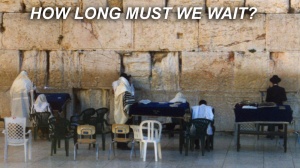 But how long must we wait? I am reminded of a story from Jerusalem. A journalist assigned to the Jerusalem bureau took an apartment overlooking the Western Wall. Every day when she looked out, she saw an old Jewish man praying vigorously. So, after several months the journalist went down and introduced herself to the old man.
But how long must we wait? I am reminded of a story from Jerusalem. A journalist assigned to the Jerusalem bureau took an apartment overlooking the Western Wall. Every day when she looked out, she saw an old Jewish man praying vigorously. So, after several months the journalist went down and introduced herself to the old man.
She asked, “You come every day to the wall. How long have you done that and what are you praying for?”
The old man replied, “I have come here to pray every day for 25 years. In the morning I pray for world peace and then for the brotherhood and sisterhood of all people. I go home have a cup of tea and I come back and pray for the eradication of illness and disease from the earth.”
The journalist was amazed. “How does it make you feel to come here every day for 25 years and pray for these things?” she asked.
The old man looks at her sadly and replied, “How do I feel? Like I’m talking to a wall.”
SLIDE 15: JESUS HAS GONE ON BEFORE US
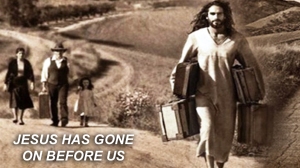 So when will the Messiah come? When will our waiting be over? But the Messiah my friends is already here! Don’t you remember the words of the angels? “He is not here, he is risen from the dead, and he has gone on before you.” Jesus has gone on before us into the world. He is not in the manger, or in Capernaum, or on the Mount of Beatitudes or in the tomb. I know, I have visited all those places. Jesus is not there. He is not lurking behind the Christmas tree or hiding in the lights or the ornaments or in the sanctuaries of churches. The Messiah has gone on before us into the world, and if we would seek the Messiah we must look for him there. Wherever people are in need, we will find Jesus.
So when will the Messiah come? When will our waiting be over? But the Messiah my friends is already here! Don’t you remember the words of the angels? “He is not here, he is risen from the dead, and he has gone on before you.” Jesus has gone on before us into the world. He is not in the manger, or in Capernaum, or on the Mount of Beatitudes or in the tomb. I know, I have visited all those places. Jesus is not there. He is not lurking behind the Christmas tree or hiding in the lights or the ornaments or in the sanctuaries of churches. The Messiah has gone on before us into the world, and if we would seek the Messiah we must look for him there. Wherever people are in need, we will find Jesus.
SLIDE 16: THE MESSIAH WAITS FOR US
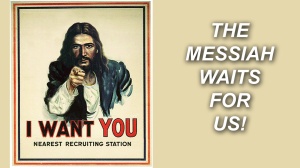 During this season when we give gifts to one another — often gifts no one needs or wants — to people who have everything. Is there someone you know who has a genuine need you can supply? We have good spiritual friends among us who are trying to live on disability and limited incomes. We don’t really have to look very far to be able to touch genuine need. And it may not be a material gift that we give. Maybe there is someone who needs the gift of a listening ear, or the gentle touch of friendship. Become a peace maker. The Messiah waits for us!
During this season when we give gifts to one another — often gifts no one needs or wants — to people who have everything. Is there someone you know who has a genuine need you can supply? We have good spiritual friends among us who are trying to live on disability and limited incomes. We don’t really have to look very far to be able to touch genuine need. And it may not be a material gift that we give. Maybe there is someone who needs the gift of a listening ear, or the gentle touch of friendship. Become a peace maker. The Messiah waits for us!
Called to Gift
Posted: November 27, 2016 Filed under: Uncategorized Leave a commentCalled to Gift
SLIDE 8: JUDAH WEAK NATION CAUGHT BETWEEN EMPIRES
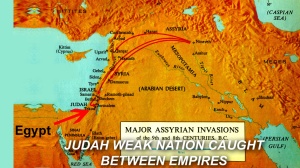 Poor Judah was a small weak nation caught between the giant Empires of Assyria and Egypt. The Jews were sort of a back water occupying a mountainous piece of land, and they might have been left alone, except that through an unusual blessing of nature, the hills of Judah and Samaria, if properly terraced grew olives and grapes in abundance. While the river lands of the Tigris and Euphrates and the Nile Rivers grew grain in profusion, they did not produce wine or olive oil. And so poor little Judah was coveted by those Empires. The Jews lived in a heightened state of tension always afraid that foreign armies were ready to invade and take over their country.
Poor Judah was a small weak nation caught between the giant Empires of Assyria and Egypt. The Jews were sort of a back water occupying a mountainous piece of land, and they might have been left alone, except that through an unusual blessing of nature, the hills of Judah and Samaria, if properly terraced grew olives and grapes in abundance. While the river lands of the Tigris and Euphrates and the Nile Rivers grew grain in profusion, they did not produce wine or olive oil. And so poor little Judah was coveted by those Empires. The Jews lived in a heightened state of tension always afraid that foreign armies were ready to invade and take over their country.
SLIDE 9: SWORDS INTO PLOWSHARES SPEARS INTO PRUNING HOOKS
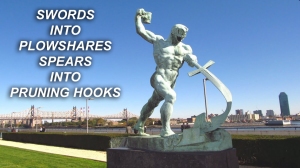 In the midst of the international tensions of his day Isaiah the prophet had a vision. In his dream Mt. Zion and the temple of Yaweh would be lifted up and become a shining beacon of peace and justice to all the nations.
In the midst of the international tensions of his day Isaiah the prophet had a vision. In his dream Mt. Zion and the temple of Yaweh would be lifted up and become a shining beacon of peace and justice to all the nations.
Many peoples shall come and say, “Come, let us go up to the
Mountain of the Lord, to the house of the God of Jacob; that she may teach us her ways and that we may walk in her paths.”
For out of Zion shall go forth instruction, and the word of the Lord from Jerusalem. He shall judge between the nations, and shall arbitrate for many peoples; they shall beat their swords into plowshares, and their spears into pruning hooks; nation shall not lift up sword against nation, neither shall they learn war any more.
Isaiah had this beautiful vision 700 years before the birth of Jesus, always hoping that human beings could find another way – the way of the Messiah who in Jesus pointed us to the way of non-violent love:
SLIDE 10: TURN THE OTHER CHEEK
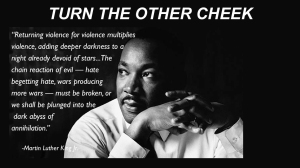 Matthew 5: 38 “Here’s another old saying that deserves a second look, said Jesus: “‘Eye for eye, tooth for tooth.’ 39 Is that going to get us anywhere? Here’s what I propose: ‘Don’t hit back at all.’ If someone strikes you, stand there and take it. If anyone slaps you on the right cheek, turn to them the other cheek also. 40 If someone drags you into court and sues for the shirt off your back, giftwrap your best coat and make a present of it. 41 And if someone takes unfair advantage of you, use the occasion to show them love. 42 No more tit-for-tat stuff. Live generously. 42 Give to the one who asks you, and do not turn away from the one who wants to borrow from you. 43 “You’re familiar with the old written law, ‘Love your friend,’ and its unwritten companion, ‘Hate your enemy.’ 44 Well I’m challenging that. I’m telling you to love your enemies. Let them bring out the best in you, not the worst. When someone gives you a hard time, respond with the energies of love, 45 for then you are working out of your true selves, your God-created selves.
Matthew 5: 38 “Here’s another old saying that deserves a second look, said Jesus: “‘Eye for eye, tooth for tooth.’ 39 Is that going to get us anywhere? Here’s what I propose: ‘Don’t hit back at all.’ If someone strikes you, stand there and take it. If anyone slaps you on the right cheek, turn to them the other cheek also. 40 If someone drags you into court and sues for the shirt off your back, giftwrap your best coat and make a present of it. 41 And if someone takes unfair advantage of you, use the occasion to show them love. 42 No more tit-for-tat stuff. Live generously. 42 Give to the one who asks you, and do not turn away from the one who wants to borrow from you. 43 “You’re familiar with the old written law, ‘Love your friend,’ and its unwritten companion, ‘Hate your enemy.’ 44 Well I’m challenging that. I’m telling you to love your enemies. Let them bring out the best in you, not the worst. When someone gives you a hard time, respond with the energies of love, 45 for then you are working out of your true selves, your God-created selves.
SLIDE 11: GOD MAKES THE RAIN TO FALL AND THE SUN TO SHINE
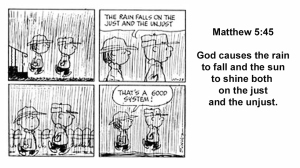 This is what God does. God gives the best — the sun to warm and the rain to nourish — to everyone, regardless: the good and bad, the nice and nasty.”
This is what God does. God gives the best — the sun to warm and the rain to nourish — to everyone, regardless: the good and bad, the nice and nasty.”
SLIDE 12: WE BRING THE LIGHT OF CHRIST INTO THE WORLD
As we enter the darkest time of the year in the season of Advent and perhaps a dark time in our nation’s history we are encouraged to hold up the dream of Isaiah and message of Jesus as a light to the world. And how do we bring the light of Christ into the world? Let me start with a story about a children’s sermon.
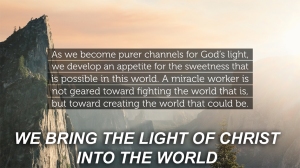 One Sunday in the middle of Advent during the children’s sermon, the preacher was telling the kids about how the angel came to Mary to tell her about how she would help bring Jesus into the world. One little girl seemed puzzled about this whole scene. Then another child asked what the preacher thought the first thing Mary would have asked for after the angel left her. Instantly this little girl chimed in with “I’ll bet she asked for a little help from Joseph!
One Sunday in the middle of Advent during the children’s sermon, the preacher was telling the kids about how the angel came to Mary to tell her about how she would help bring Jesus into the world. One little girl seemed puzzled about this whole scene. Then another child asked what the preacher thought the first thing Mary would have asked for after the angel left her. Instantly this little girl chimed in with “I’ll bet she asked for a little help from Joseph!
SLIDE 13: WE NEED HELP FROM FRIENDS
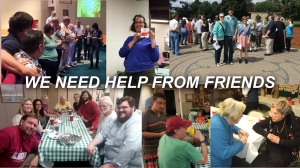 If we are going to bring the light of Christ into the world we need a little help from others, we can’t do it alone. That is one reason we gather every Sunday for worship. We need to be reminded that we have been given what looks like an impossible task, changing the ways of the world to embrace love instead of violence, and the self-interested survival of the fittest.
If we are going to bring the light of Christ into the world we need a little help from others, we can’t do it alone. That is one reason we gather every Sunday for worship. We need to be reminded that we have been given what looks like an impossible task, changing the ways of the world to embrace love instead of violence, and the self-interested survival of the fittest.
SLIDE 14: PHYSICAL THERAPY CLUB
 I am reminded of a story from the physical therapy club. As you know several members of our congregation have been in physical therapy this year, and physical therapy is difficult. Our muscles lose their memory quickly, when through illness, injury or stroke we do not use them even for a short period of time. They have to be retrained to work properly. I remember trying to rehab my shoulder the physical therapist gave me what seemed like a real nothing exercise saying, “This exercise is supposed to help the muscle attached to your should blade turn on.” Well I did the exercise for weeks and then one day I could feel the muscle turning on.
I am reminded of a story from the physical therapy club. As you know several members of our congregation have been in physical therapy this year, and physical therapy is difficult. Our muscles lose their memory quickly, when through illness, injury or stroke we do not use them even for a short period of time. They have to be retrained to work properly. I remember trying to rehab my shoulder the physical therapist gave me what seemed like a real nothing exercise saying, “This exercise is supposed to help the muscle attached to your should blade turn on.” Well I did the exercise for weeks and then one day I could feel the muscle turning on.
SLIDE 15: IF IT WASN’T DIFFICULT YOU WOULDN’T BE HERE
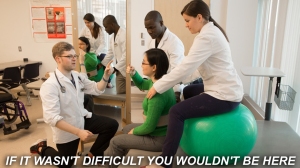 Well another member of our PT club was working with another physical therapist who gave her a task to do, and she complained, “This is impossible!”
Well another member of our PT club was working with another physical therapist who gave her a task to do, and she complained, “This is impossible!”
Very patiently and gently the therapist replied, “It is not impossible. It is difficult. But if it wasn’t difficult, you wouldn’t be here.”
SLIDE 16: WE ARE GOD’S ADVENT TO HOLD BACK THE DARKNESS
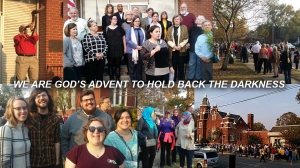 And I think that is sort of the response that Jesus makes, when we complain about working to help the world embrace love. Jesus called the church into being because we all need a little help from our friends. Like when a number of members of our congregation showed up together at the Synagogue to sing, pray, and march to bring peace and healing after the election. And while peace on earth maybe difficult, if it wasn’t difficult we wouldn’t be here! Later in this worship, when we form the circle to share the Advent Communion, so we can look one another in the eye and remember how God has given us each other, so together we might help bring the light of Christ into the world. We are God’s Advent. We are God’s hands and feet in the world to help hold back the gathering darkness of despair.
And I think that is sort of the response that Jesus makes, when we complain about working to help the world embrace love. Jesus called the church into being because we all need a little help from our friends. Like when a number of members of our congregation showed up together at the Synagogue to sing, pray, and march to bring peace and healing after the election. And while peace on earth maybe difficult, if it wasn’t difficult we wouldn’t be here! Later in this worship, when we form the circle to share the Advent Communion, so we can look one another in the eye and remember how God has given us each other, so together we might help bring the light of Christ into the world. We are God’s Advent. We are God’s hands and feet in the world to help hold back the gathering darkness of despair.
SLIDE 17: DON’T GIVE UP THE LIGHT WILL RETURN
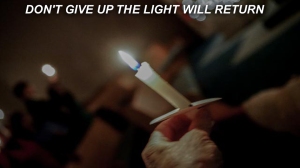 And let me acknowledge, it is so easy to give into despair, especially this time of year, when the darkness seems to take over our lives. For some of us seasonal affective disorder can threaten to plunge us into a depression that will not end. The promise of Advent is the light will return. Hope is often born in the darkness. Hope is often fragile, vulnerable, like a new born infant born in a cave. Hope is often poor, like peasants who had to lay their baby in a feed trough for animals. Hope often seems powerless, like the Holy Family forced to flee from the soldiers of Herod, who had been sent to seek the life of the Christ Child. So don’t give up. Celebrate this season. Celebrate friendship, love, hope and faith. Even more than Christmas we are a Resurrection people. God will not abandon us. God’s love is forever. Just as Jesus was God’s gift to the world, so now those who follow the way of Jesus are God’s gift to the world.
And let me acknowledge, it is so easy to give into despair, especially this time of year, when the darkness seems to take over our lives. For some of us seasonal affective disorder can threaten to plunge us into a depression that will not end. The promise of Advent is the light will return. Hope is often born in the darkness. Hope is often fragile, vulnerable, like a new born infant born in a cave. Hope is often poor, like peasants who had to lay their baby in a feed trough for animals. Hope often seems powerless, like the Holy Family forced to flee from the soldiers of Herod, who had been sent to seek the life of the Christ Child. So don’t give up. Celebrate this season. Celebrate friendship, love, hope and faith. Even more than Christmas we are a Resurrection people. God will not abandon us. God’s love is forever. Just as Jesus was God’s gift to the world, so now those who follow the way of Jesus are God’s gift to the world.
The Star Thrower by Loren Eiseley
Posted: November 25, 2016 Filed under: Uncategorized Leave a commentThe Star Thrower by Loren Eiseley
A Study Guide
A note: Loren Eiseley was writing before we had developed a consciousness about sexist language. I think had he been writing after that change in our culture, given his appreciation of evolution, he would have used non-sexist language, but no attempt in this study guide has been made to re-write his work.
Perhaps a clue to the importance of this book is that both the Editor’s Preface and the Introduction by W.H. Auden both merit a close reading. In the Editor’s Preface Kenneth Heuer notes that one of Eiesley’s fans was Ray Bradbury the science fiction writer whose work has survived his death and has been enlarged upon by others. We might note here that Ray Bradbury was a member of the United Church of Christ whose work is certainly a testimony to the God Is Still Speaking Initiative in our denomination. The Spirit of Loren Eiseley is in tune with the vision of Ray Bradbury and the United Church of Christ.
Page 20: W. H. Auden provides us with an important insight into the character of Loren Eiseley and his unique spirituality:
. . . More importantly, he reveals himself as a man well trained in the habit of prayer, by which I mean the habit of listening. The petitionary aspect of prayer is its most trivial because it is involuntary. We cannot help asking that our wishes may be granted, though all to many of them are like wishing that two and two may make five, and cannot and should not be granted. But the serious part of prayer begins when we have got our begging over with and listen for the Voice of what I would call the Holy Spirit, though if others prefer to say the Voice of Oz or the Dreamer or Conscience, I shan’t quarrel, so long as they don’t call it the Voice of the Super-Ego, that that “entity” can only tell us what we know already, whereas the Voice I am talking about always says something new and unpredictable – an unexpected demand, obedience to which involves a change of self, however painful.
Auden points in the direction of a spirituality without religion. Are you comfortable with a non-religious spirituality? How would you describe your own spirituality? Can you discern any spiritual disciplines that might help you become a better listener?
The Judgment of the Birds
Page 21: It is a commonplace of all religious thought, even the most primitive, that the man seeking visions and insight must go apart from his fellows and live for a time in the wilderness. If he is of the proper sort, he will return with a message. It may not be a message from the god he set out to seek, but even if he has failed in that particular, he will have had a vision or seen a marvel, and these are always worth listening to and thinking about. . . .
. . . One must seek, then, what only the solitary approach can give – a natural revelation.
Let it be understood that I am not the sort of man to whom is entrusted direct knowledge of great events or prophecies. A naturalist, however, spends much of his life alone, and my life is no exception. . .
Have you ever taken time to retreat into nature to observe and listen? Have you found any wisdom or revelations in nature? Eiseley seems to have been something of an introvert. Do you think introverts have any spiritual advantages? What are the biggest disadvantages of introversion? Do you think there are natural revelations? Have you experienced one?
Page 33 – 34: I have said that I saw a judgment upon life, and that it was not passed by men. . . I shall never see an episode like it again if I live to be a hundred, nor do I think that one man in a million has ever seen it, because man is an intruder into such silences. The light must be right, and the observer must remain unseen. No man sets up such an experiment. What he sees, he sees by chance.
You may put it that I had come over s mountain, that I had slogged through fern and pine needles for half a long day, and that on the edge of a little glade with on long, crooked branch extending across it, I had sat down to rest with my back against a stump. Through accident I was concealed from the glade, although I could see into it perfectly.
The sun was warm there, and the murmurs of forest life blurred softly away into my sleep. When I awoke, dimly aware of some commotion and outcry in the clearing, the light was slanting down through the pines in such a way that the glade was lit like some vast cathedral. I could see the dust motes of wood pollen in the long shaft of light, and there on the extended branch sat an enormous raven with a red and squirming nestling in his beak.
The sound that awoke me was the outraged cries of the nestling’s parents, who flew helplessly in circles about the clearing. The sleek black monster was indifferent to them. He gulped, whetted his beak on the dead branch a moment, and sat still. Up to that point the little tragedy had followed the usual pattern. But suddenly, out of all that area of woodland, a soft sound of complaint began to rise. Into the glade fluttered small birds of half a dozen varieties drawn by the anguished outcries of the tiny parents.
No one dared to attack the raven. But they cried there in some instinctive common misery, the bereaved and the un-bereaved. The glade filled with their soft rustling and their cries. They fluttered as though to point their wings at the murderer. There was a dim intangible ethic he had violated, that they knew. He was a bird of death.
The sighing died. It was then I saw the judgment. It was the judgment of life against death. I will never see it again so forcefully presented. I will never dear it again in notes so tragically prolonged. For in the midst of protest, they forgot the violence. There, in that clearing the crystal note of a song sparrow lifted hesitantly in the hush. And finally, after painful fluttering, another took the song, and then another, the song passing from one bird to another, doubtfully at first, as though some evil thing were being slowly forgotten. Till suddenly they took heart and sang from many throats joyously together as birds are known to sing. They sang because life is sweet and sunlight beautiful. They sang under the brooding shadow of the raven. In simple truth they had forgotten the raven, for they were the singers of life, and not death.
Did the raven do anything wrong? Have you ever encountered a bird of death, or any other animal representing death? Can we observe animals mourning? What would it mean to be a singer of life?
Page 34 – 36: . . . on the top of a step ladder, I made one more observation upon life. It was cold that autumn evening, and standing under a suburban street light in a spate of leaves and beginning snow, I was suddenly conscious of some huge and hairy shadows dancing over the pavement. . . I was standing under the shadow of an orb-weaving spider. Gigantically projected against the street, she was about her spinning when everything else was going underground. . .
I procured a ladder from my yard and climbed up to inspect the situation. . .
I stood over her a moment longer, comprehending somewhat reluctantly that her adventure against the great blind forces of winter, her seizure of this warming globe of light, would come to nothing and was hopeless. Nevertheless it brought the birds back into my mind, and that faraway song which had traveled with growing strength around a forest clearing years ago – a kind of heroism, a world where even a spider refuses to lie down and die if rope can still be spun on to s star. Maybe man himself will fight like this in the end, I thought, slowly realizing that the web and its threatening yellow occupant had been added to some luminous store of experience, shining for a moment in the fogbound reaches of my brain.
The mind, it came to me as I slowly descended the ladder, is a very remarkable thing; it has gotten itself a kind of courage by looking at a spider in a street lamp. Here was something that ought to be passed on to those who will fight our final freezing battle with the void. I thought of setting it down carefully as a message to the future: In the days of the frost seek a minor sun.
But as I hesitated, it became plain that something was wrong. The marvel was escaping – a sense of bigness beyond man’s power to grasp, the essence of life in its great dealings with the universe. It was better, I decided, for the emissaries returning from the wilderness, even it they were merely descending from a stepladder, to record their marvel, not to define its meaning. In that way it would go echoing on through the minds of men, each grasping at that beyond out of which the miracles emerge, and which, once defined, ceases to satisfy the human need for symbols.
Do you sense futility or heroism in fighting battles that are hopeless? Do you think it is important for people to refuse to lie down and die? (Rage, rage against the dying of the light?) Or is there a wisdom in knowing the times and the seasons, and knowing when to let go? Do you have any stories you need to pass on without defining their meaning for those to whom you are telling them? What do you think it is about humans that we are so attracted to symbols?
The Long Loneliness
Page 37: There is nothing more alone in the universe than man. He is alone because hoe has the intellectual capacity to know that he is separated by a vast gulf of social memory and experiment from the lives of his animal associates. . . .
Man, by contrast, is alone with the knowledge of his history until the day of his death. When we were children we wanted to talk to animals and struggled to understand why this was impossible. Slowly we gave up the attempt as we grew into the solitary world of human adulthood. . .
Do you try to talk to animals? Do you ever experience your pets responding to you? Do you think we are as alone as Eiseley seems to portray us? Why do you think so many people keep pets?
Page 39 – 42: We are forced to ask ourselves whether native intelligence in another form than man’s might be as high as or even higher than his own, yet be marked by no such material monuments as man has placed upon the earth. At first glance we are alien to this idea, because man is particularly a creature who has turned the tables on his environment so that he is now engrossed in shaping it, rather than being shaped by it. Man expressed himself upon his environment through the use of tools. We therefore tend to equate the use of tools in a one to one relationship with intelligence.
The question we must now ask ourselves, however, is whether this involves an unconsciously man-centered way of looking at intelligence. Let us try for a moment to enter the dolphin’s kingdom and the dolphin’s body, retaining, at the same time, our human intelligence. In this imaginative act, it may be possible to divest ourselves of certain human preconceptions about our kind of intelligence and at the same time to see more clearly why mind, even advanced mind, may have manifestations other than the tools and railroad tracks and laboratories that we regard as evidence of intellect. . .
The result is immediately evident and quite clear: No matter how well we communicate with our fellows through the water medium we will never build drowned empires in the coral; we will never inscribe on palace walls the boasts of porpoise kings. . .
Over all that region of wondrous beauty we will exercise no more control than the simplest mollusk. Even the octopus with flexible arms will build little shelters that we cannot imitate. Without hands we will have only the freedom to follow the untrammeled sea winds across the planet. . .
Man without writing cannot long retain his history in his head. His intelligence permits him to grasp some kind of succession of generations, but without writing, the tale of the past rapidly degenerates into fumbling myth and fable. Man’s greatest epic, his four long battles with the advancing ice of the great continental glaciers, has vanished from human memory without a trace. Our illiterate fathers disappeared and with them, in a few scant generations, died on of the great stories of all time. This episode has nothing to do with the biological quality of the brain as between then and now. It has to do instead with a device, an invention made possible by the hand. That invention came too late in time to record eyewitness accounts of the years of the Giant Frost. . .
Writing, and later printing, is the product of our adaptable many-purposed hands. It is thus, through writing, with no increase in genetic, inborn capacity since the last ice advance, that modern man carries in his mind the intellectual triumphs of all his predecessors who were able to inscribe their thoughts for posterity.
How important are our hands to the development of human intelligence? How has writing changed human intelligence? Is our intelligence also dependent upon the transmission of culture? Are we in an age when cultural evolution may have become as important, or more important than biological evolution?
Page 42-44: . . . . One of the surprising things about the porpoise is that his superior brain is unaccompanied by any type of manipulative organ. He has, however, a remarkable range-finding ability involving some sort of echo-sounding. Perhaps this acute sense — for more accurate than any man has been able to devise artificially – brings him greater knowledge of his watery surroundings than might at first seem possible. Human beings think of intelligence as geared to things. The hand and the tool are to us the unconscious symbols of our intellectual achievement. It is difficult for us to visualize another kind of lonely, almost disembodied intelligence floating in the wavering green fairyland of the sea – an intelligence possibly near or comparable to our own but without hands to build, to transmit knowledge by writing, or to alter by one hairsbreadth the planet’s surface. Yet at the same time there are indications that this is a warm, friendly and eager intelligence quite capable of coming to the assistance of injured companions and striving to rescue them from drowning. . .
Perhaps man has something to learn after all from fellow creatures without the ability to drive harpoons through living flesh, or poison with strontium the planetary winds. . . “Genius in the porpoise? Has the porpoise ever written a book, spoken a speech? No, his great genius is declared in his doing nothing particular to prove it. It is declared in his pyramidical silence.” If man had sacrificed his hands for flukes, the moral might run, he would still be a philosopher, but there would have been taken from him the devastating power to wreak his thought upon the body of the world. . . This role would now be a deserved penitence for man. Perhaps such a transformation would bring him once more into the mood of childhood innocence in which he talked successfully to all things living but had no power and not urge to harm. It is worth at least a wistful thought that someday the porpoise may talk to us and we to him. It would break, perhaps, the long loneliness that has made man a frequent terror and abomination even to himself.
Our human ability to destroy as well as create may be a clue to the myths about original sin. What do you think? What would we have to sacrifice in order to embrace the “mood of childhood innocence.” Do you think any of our animal research will offer us clues to non-human intelligence? How is intelligence related to “consciousness?” Is there a difference between “consciousness” and “moral consciousness?” Do you think our intelligence can save us from poisoning the planetary winds with strontium?
Man the Firemaker
Page 45 – 48 Man, it is well to remember, is the discoverer but not the inventor of fire. Long before this meddling little Prometheus took to experimenting with flints, then matches, and finally (we hope not too finally) hydrogen bombs, fires had burned on this planet. . .
Man did not invent fire but he did make it one of the giant powers on earth. . . . Man’s long adventure with knowledge has, to a very marked degree, be a climb up the heat ladder, for heat alone enables man to mold metals and glassware, to create his great chemical industries, to drive his swift machines. . . . AS we follow man on this journey, we shall learn another aspect of his nature: that he is himself a consuming fire. . .
The second stage in human history is represented by the first true humans. Paleoanthropic man is clearly a tool user, a worker in stone and bone, but there is still something of the isolated tinkerer and fumbler about him. . . It is quite clear that some of these men knew the use of fire, but many may not have.
The third act begins some 15,000 or 20,000 years ago. The last great ice sheet still lies across northern Europe and North America. . . . Suddenly, into this late paradise of game, there erupts our own species of man – Homo Sapiens. Just where he came from we do not know. Tall lithe, long-limbed, he is destined to overrun the continents in the blink of a geological eye. He has an excellent projectile weapon. . . His flint work is meticulous and sharp. And the most aggressive carnivore the world has ever seen comes at a time made for his success: the grasslands are alive with seemingly inexhaustible herds of game.
Yet fire as much as flesh was the magic that opened the way for the supremacy of Homo sapiens. . . .
Fire shortens the digestive process. It breaks down the tough masses of flesh into food that the human stomach can easily assimilate. Fire made the difference that enabled man to expand his numbers rapidly and to press on from hunting to more advanced cultures. . .
With fire primitive man did more than cook his meat. He extended the pasture for grazing herds. . . . fire was a major factor along with soil, moisture, temperature, wind, animals and so forth in determining the types of plants occurring in any region. . . the vegetation of the Great Plains was a fire vegetation. . . Here, as in many other regions, man’s fire altered the ecology of the earth.
Today we are very concerned about human activity altering the environment. Have you ever considered how far back in history human activity has been altering the earth’s environment? Has the impact of human activity changed over time? How is fire still at the heart of human impact on our environment?
Page 49 – 52: Man, as I have said, is himself a flame. He has burned through the animal world and appropriated its vast stores of protein for his own. When the great herds failed over many areas, he had to devise new ways to feed his increase or drop back himself into a precarious balance with nature. . . Their economy permits no bursts of energy beyond what is necessary for the simple age old struggle with nature. . .
Nevertheless there is no road back, the primitive way, is no longer our way. We are the inheritors of an aggressive culture which, when the great herds disappeared turned to agriculture. Here again the magic of fire fed the great human wave and built up man’s numbers and civilization.
. . . In the process of adopting the agricultural way of life he made his second chemical experiment with heat: baking pottery. Ceramics may have sprung in part for the need for storage vessels. . .
After man had learned to change the chemical nature of clay, he began to use fire to transform other raw materials. . .
How far will he go? Three hundred years of the scientific method have built the great sky-touching buildings and nourished the incalculable fertility of the human species. But man is also Homo duplex, as they knew in the darker ages. He partakes of evil and of good, of god and of man. Both struggle in him perpetually. And he is himself a flame — a great roaring, wasteful furnace devouring irreplaceable substances of the earth. Before this century is out, either Homo duplex must learn that knowledge without greatness of spirit is not enough for man, or there will remain only his calcined cities and the little charcoal of his bones.
Humans are a flame who have burned through the world appropriately vast stores of energy and material for their own, a wasteful furnace. But there is no road back from the aggressive culture. Or is there? If we are going to survive on the planet, do we need to find a less aggressive and more cooperative way of being? Eiseley seems to be concerned about nuclear destruction “calcined cities and the little charcoal of his bones.” Do you think this is still a concern given deteriorating relations between the U.S. the E.U. and Russia? Or do you think there are greater threats to the future of our species? To what extent do you see the problem of our human aggressive culture as a spiritual problem?
The Innocent Fox
Page 53 – 54: Since man first saw an impossible visage staring upward from a still pool, he has been haunted by meanings . . . .
. . . . We have come from the dark wood of the past, and our bodies carry the scars and unhealed wounds of that transition. Our minds are haunted by night terrors that arise from the subterranean domain of racial and private memories.
Lastly, we inhabit a spiritual twilight on this planet. It is perhaps the most poignant of all the deprivations to which man has be exposed by nature. I have said deprivation, but perhaps I should rather maintain that this feeling of loss is an unrealized anticipation. We imagine we are day creatures, but we grope in a lawless and smoky realm toward an exit that eludes us. We appear to know instinctively that such an exit exists.
I am not the first man to have lost his way only to find, if not a gate a mysterious hole in a hedge that a child would know at once led to some other dimension at the world’s end. Such passageways exist, or man would not be here. Not for nothing did Santayana once contend that life is a movement from the forgotten to the unexpected.
As adults, we are preoccupied with living. As a consequence, we see little. At the approach of age some men look about them at last and discover a hole in the ledge leading to the unforeseen. By then, there is frequently no child companion to lead them safely through. After one of two experiences of getting impaled on thorns, the most persistent individual is apt to withdraw and to assert angrily that no such opening exists.
My experience has been quite the opposite, but I have been fortunate. After several unsuccessful but tantalizing trials, which I intend to disclose, I had the help, not of a child, but of a creature – a creature who, appropriately came out of a quite unremarkable and prosaic den. There was nothing, in retrospect, at all mysterious or unreal about him. Nevertheless, the creature was baffling, just as, I suppose, to animals, man himself is baffling.
What do you think Eiseley is trying to get at, when he talks about the hole in the hedge? Do you think that humans as a whole are haunted by meaning? “As adults, we are preoccupied with living. As a consequence, we see little. At the approach of age some men look about them at last and discover a hole in the hedge. . . “ Have you reached an age, where you begin to be able to see meaning beyond the everyday? What experiences have offered you the most sense of meaning? Do you think it is possible to manage your way through the hole in the hedge without encountering thorns?
Page 57 – 62: . . .After all, there was nothing to explain my disappointment. I had not known for what I was searching.
Or perhaps I did know, secretly, and would not admit it to myself: I wanted a miracle. Miracles by definition, are without continuity, and perhaps my rooftop scientist had nudged me in that direction by the uncertainty of this departure. The only thing that characterizes a miracle, to my mind, is its sudden appearance and disappearance within the natural order, although, strangely, this loose definition would include each individual person. Miracles, in fact, momentarily dissolve the natural order or place themselves in opposition to it. . . There was magic, but is was an autumnal, sad magic. I had a growing feeling that miracles were particularly concerned with life, with the animal aspect of things. . . .
. . . That was how the true miracle, my own miracle, came to me in its own time and fashion. . .
The episode occurred upon an unengaging and unfrequented shore. It began in the late afternoon of a day devoted at the start to ordinary scientific purposes. There was the broken prow of a beached boat subsiding in heavy sand, left by the whim of ancient currents a long way distant from the shifting coast. . .
I sat down and rested with my back against the overturned boat. All around me the stillness intensified and the wandering tendrils of fog continued their search. . .
The man lay back among the pillows, wracked, yellow, and cadaverous. Though I was his son he know me only as one lamp is briefly lit from another in the windy night. He was beyond speech, but a question was there, occupying the dying mind, excluding the living, something before which all remaining thought had to be mustered. At the time I was too young to understand. Only now could the hurrying shadow drawn from the wrecked boat interpret and relive the question. The starving figure on the bed as held back from death only be the magnificent heart that would not die.
I, the insubstantial substance of memory, the dispersed droplets of the ranging fog, saw the man lift his hands for the last time. Strangely, in all that ravished body, they alone had remained unchanged. They were strong hands of a craftsman who had played my roles in his life: actor, laborer, professional runner. . . Now in the last lucid moment, he had lifted them up and, curiously, as though they belonged to another being, he had turned and flexed them, gazed upon them unbelievingly, and dropped them once more.
Have you ever wished for a miracle? Have you ever experienced an occurrence that in retrospect you would say was miraculous? How do you think the author’s desire for a miracle was related to his vision of his father’s death?
Page 62 – 64: Suddenly I was back under the overhang of the foundered boat. . . .
I was a biologist, but I chose not to examine my hands. . . Finally the dawn began to touch the sea, and then the worn timbers of the hulk beside which I sheltered reddened just a little. It was then I began to glimpse the world from a different perspective. . .
. . . It was then I saw the miracle. I saw it because I was hunched at ground level smelling rank of fox, and no longer gazing with upright human arrogance upon the things of this world.
I did not realize what it was that I looked upon. As my wandering attention centered, I saw nothing but two small projecting ears lit by the morning sun. Beneath them, a small neat face looked shyly up at me. The ears moved at every sound, drank in a gull’s cry and the far horn of a ship. They crinkled, I began to realize only with curiosity; they had not learned to fear. The creature was very young. He was alone in a dread universe. I crept on my knees around the prow and crouched beside him. It was a small fox pup from a den under the timbers who looked up at me. God knows what had become of his brothers and sisters. His parent must not have been home from hunting.
He innocently selected what I think was a chicken bone from an untidy pile of splintered rubbish and shook it at me invitingly. There was a vast and playful humor in his face. . . . It has been said repeatedly that one can never, try as he will, get around to the front of the universe. Man is destined to see only its far side, to realize nature only in retreat.
Yet here was the think in the midst of the bones, the wide-eyed, innocent fox inviting me to play, with the innate courtesy of its two forepaws placed appealingly together, along with a mock shake of the head. The universe was swinging in some fantastic fashion around to present its face, and the face was so small that the universe itself was laughing.
Can you see a parallel between Eiseley’s “getting around in front of the universe,” and Moses’ desire to see God face to face? God only allows Moses a glimpse of his back. Do you think the author has indeed seen the universe (God) in the little fox pup? How important is the fox pup’s offer to play to the author’s sense of miracle and divine?
Pages 64 – 65: It was not a time for human dignity. It was a time only for the careful observance of amenities written behind the stars. Gravely I arranged my forepaws while the puppy whimpered with ill-concealed excitement. I drew the breath of a fox’s den into my nostrils. On impulse I picked up clumsily a whiter bone and shook it in teeth that had not entirely forgotten their original purpose. Round and round we tumbled for one ecstatic moment.
But I had seen my miracle. I had seen the universe as it begins for all things. It was, in reality, a child’s universe, a tiny and laughing universe. I rolled the pup on his back and ran, literally ran for the nearest ridge. The sun was half out of the sea, and the world was swinging back to normal. The adult foxes would be already trotting home.
A little further on, I passed one on a ridge who knew well I had no gun, for it sung by quite close, stepping delicately with brush and head held high. Its face was watchful but averted. It did not matter. It was what I had experienced in adulthood. We passed carefully on our separate ways into the morning, eyes not meeting.
But to me the mist had come, and the mere chance of two lifted sunlit ears at morning. I knew at last why the man on the bed had smiled finally before he dropped his hands. He too, had worked around to the front of things in his death agony. The hands were playthings and had to be cast aside at last like a cherished toy. There was a meaning and there was not a meaning, and therein lay the agony.
The meaning was all in the beginning, as though time was awry. It was a little beautiful meaning that did not stay, and the sixty-year-old man on the hospital bed had traveled briefly toward it through the dark at the end of the universe. There was something in the desperate nature of the world that had to be revered, but he had been too weak to tell me, and the hands had dropped helplessly away.
After forty years I had been just his own age when the fog had come groping for my face. I think I can safely put it own that I had been allowed my miracle. It was very small, as is the way of great things. I had been permitted to correct time’s arrow for a space of perhaps five minutes – and that is a boon not granted to all men. If I were to render a report upon this episode, I would say that men must find a way to run the arrow backward. Doubtless it is impossible in the physical world, but in the memory and the will man might achieve the deed if he would try.
For just a moment I had held the universe at bay by the simple expedient of sitting on my haunches before a fox den and tumbling about with a chicken bone. It is the gravest, most meaningful act I shall ever accomplish, but, as Thoreau once remarked on some peculiar errand of his own, there is no use reporting it to the Royal Society.
Do you think the author experienced a miracle? Do you think the experience of ecstasy is inherently spiritual? Do you see the relationship between the experience of the fox pup and the author’s memory of his father’s death? Have you ever found yourself reversing the arrow of time? How important is memory in the life of the spirit? Have you ever experienced God in nature?
How Flowers Changed the World
Page 66 – 67: In those first ages plants clung of necessity to swamps and watercourses. Their reproductive processes demanded direct access to water. Beyond the primitive ferns and mosses that enclosed the borders of swamps and streams the rocks still lay vast and bare, the winds still swirled the dust of a naked planet. The grass cover that holds our world secure in place was still millions of years in the future. The green marchers had gained a soggy foothold upon the land, but that was all. They did not reproduce by seeds but by microscopic swimming sperm that had to wriggle their way through water to fertilize the female cell. . . The truth is, however, that there is nothing very “normal” about nature. Once upon a time there were no flowers at all. . . .
Somewhere, just a short time before the close of the Age of Reptiles, there occurred a soundless, violent explosion. It lasted millions of years, but it was an explosion, nevertheless. It marked the emergence of angiosperms – the flowering plants. Even the great evolutionist Charles Darwin called them “an abominable mystery,” because they appeared so suddenly and spread so fast.
Flowers changed the face of the planet. Without them, the world we know — even man himself – would never have existed. . . .
Have you ever given any consideration to the relationship between ourselves and the flowers? Can you imagine a world without flowers or grass? How different would our planet be? Does the story of the emergence of flowers give you any better appreciation of the wonder of evolution?
Page 68 – 70: The agile brain of the warm-blooded birds and mammals demands a high oxygen consumption and food in concentrated forms, or the creatures cannot long sustain themselves. It was the rise of the flowering plants that provided that energy and changed the nature of the living world. Their appearance parallels in a quite surprising manner the rise of the birds and mammals.
The event occurred in Cretaceous times in the close of the age of Reptiles. Before the coming of the flowering plants our own ancestral stock, the warm-blooded mammals, consisted of a few mousy little creatures hidden in trees and underbrush. A few lizard-like birds with carnivorous teeth flapped awkwardly on ill-aimed flights among archaic shrubbery. None of these insignificant creatures gave evidence of any remarkable talents. The mammals in particular had been around for some millions of years but had remained well lost in the shadow of the mighty reptiles. Truth to tell, man was still, like the genie in the bottle, encased in the body of a creature about the size of a rat. . .
Neither the birds nor the mammals, however, were quite what they seemed. They were waiting for the Age of Flowers. They were waiting for what flowers, and with the true encased seed, would bring. Fish-easting, gigantic, leather-winged reptiles twenty-eight feet from wing tip to wing tip, hovered over the coasts that one day would be swarming with gulls.
Stop and reflect on how mammals and the precursors of birds had been around for millions of years, awaiting a change in the environment in order to come into their own. Was it chance or design? Is there anything ever inevitable about evolution? If small but important developments have changed the face of the earth in the past, can you imagine how the earth might be changing now under our noses that might produce a completely different environment?
Page 71 – 72: . . . Nevertheless, the true flower – and the seed that it produced — was a profound innovation in the world of life.
In a way this even parallels, in the plant world, what happened among animals. Consider the relative chance for survival of the exteriorly deposited egg of a fish in contrast with the fertilized egg of a mammal, carefully retained for months in the mother’s body until the young animal (or human being) is developed to a point where it may survive. The biological wastage is less – and so it is with the flowering plants. The primitive spore, a single cell fertilized in the beginning by a swimming sperm, did not promote rapid distribution, and the young plant, moreover, had to struggle up from nothing. No one had left it any food except what it could get by its own unaided efforts.
By contrast, the true flowering plants (angiosperm itself means “encased seed”) grew a seed in the heart of a flower, a seed whose development was initiated by a fertilizing pollen grain independent of outside moisture. But the seed, unlike the developing spore, is already a fully equipped embryonic plant packed in a little enclosed box stuffed full of nutritious food. Moreover, by featherdown attachments, as in dandelion or milkweed seed, it can be wafted upward on gusts and ride the wind for miles, or with hooks it can cling to a bear’s or a rabbit’s hide; or like some of the berries, it can be covered with a juicy, attractive fruit to lure birds, pass undigested through their intestinal tracts, and be voided miles away.
The ramifications of this biological invention were endless. Plants traveled as they had never traveled before. . . Many of the older plants with more primitive reproductive mechanisms began to fade away under this unequal contest. They contracted their range into secluded environments. Some, liked the giant redwoods, lingered on as relics; many vanished entirely.
Competition seems to be one of the principal themes of evolution not only in the animal world, but also in the plant world. How did seeds impart a competitive advantage to the plants that produced them? How did seeds give a competitive advantage to warm blooded animals? Is competition still a theme in the enfolding of evolution?
Page 73 – 74: The explosion was having its effect on animal life also. Specialized groups of insects were arising to feed on the new sources of food and, incidentally and unknowingly, to pollinate the plant. The flowers bloomed and bloomed in ever larger and more spectacular varieties. . . .Intricate mechanisms splashed pollen on the breasts of hummingbirds or stamped it on the bellies of black, grumbling bees droning assiduously from blossom to blossom. Honey ran, insects multiplied, and even the descendants of that toothed and ancient lizard-bird had become strangely altered. Equipped with prodding beaks instead of biting teeth they pecked the seeds and gobbled the insects that were really converted nectar.
Across the planet grasslands were now spreading. A slow continental up-thrust which had been a part of the early Age of Flowers had cooled the world’s climates. . .
The mammals too, survived and were venturing into new domains, staring about perhaps a bit bewildered at their sudden eminence ow that the thunder lizards were gone. . .
On the edge of the forest, a strange, old-fashioned animal still hesitated. His body was the body of a tree dweller, and though tough and knotty by human standards, he was, in terms of that world into which he gazed a weakling. His teeth, though strong for chewing on the tough fruits of the forest, or for crunching an occasional unwary bird caught with his prehensile hands, were not the tearing sabers of the great cats. He had a passion for lifting himself up to see about, in his restless, roving curiosity. He would run, a little stiffly and uncertainly perhaps, on his hind legs, but only in those rare moments when he ventured out upon the ground. All this was the legacy of his climbing days; he had a hand with flexible fingers and no fine specialized hoofs upon which to gallop like the wind.
If he had any idea of competing in that new world, he had better forget it; teeth or hooves, he was much too late for either. He was a ne’er-do-well, and in-betweener. Nature had not done well by him. It was as if she hesitated and never quite made up her mind. Perhaps as a consequence he had a malicious gleam in his eye, the gleam of an outcast who has been left nothing and knows he is going to have to take what he gets. One day a little band of these odd apes – for apes they were – shambled out upon the grass, the human story had begun.
Eiseley suggests that the process of evolution was complimentary. New insets developed to accommodate the needs of the flowers, and birds evolved to take advantage of new food sources. Can you see how all things have been evolving together? Does the story as Eiseley narrates it suggest a direction in the evolutionary process? While other animals became more specialized in response to the flowers, what happened to the precursors of human beings? Do you think it was actually an advantage to remain an “in-betweener?” How do you feel about Eiseley’s statement: “Perhaps as a consequence he had a malicious gleam in his eye, the gleam of an outcast who has been left nothing and knows he is going to have to take what he gets?”
The Ghostly Guardian
Page 81 – 82: Darwin always troubled by such problems, used to speak of the mysterious and unknown laws governing these matters. Unlike many of this followers he had no illusions that he had solved all the mysteries of life and evolution. Reading this works one is often made aware of how that great mind hesitated painfully over much that his followers take for granted.
Once he expressed himself to the effect that the independent duplication of a single animal form, if proven for two separate areas of the world, might force him to entertain the possibility of some other explanation for evolution than that offered by chance mutations acted upon by natural selection. Strangely enough, these monkeys of South America offer an evolutionary problem very close to, though admittedly not identical with, the hypothetical case proposed by Darwin. These monkeys, while not totally identical anatomically with those of the Old World, are remarkably similar to them. In fact, only the sophisticated observer can recognize the difference. Yet the separation of these two monkey groups from each other is ancient, and no ancestral monkey remains connecting the Old World with the New are known by fossil hunters.
Instead, it is believed by many authorities that the New World and Old World monkeys have arisen as parallel developments from older pre-monkey forms, the lemurs, which were once spread over the whole region of Asia to South America. In this case, creatures of very similar brain, face, habits, and general appearance would have come into being in separate parts of the world from ancestors far below the monkey level. Such a development might suggest latent evolutionary powers not entirely the simple product of what we, in our ignorance of a better word, call chance. We are not in a position yet to verify absolutely this interpretation of the separate origins of Old and New World monkey, but it is the most reasonable theory that we possess.
And here is the latest theory about Old and New World Monkeys from Wikipedia: New World monkeys are the five families of primates that are found in Central and South America and portions of Mexico: Callitrichidae, Cebidae, Aotidae, Pitheciidae, and Atelidae. The five families are ranked together as the Platyrrhini parvorder and the Ceboidea superfamily, which are essentially synonymous since Ceboidea is the only living platyrrhine superfamily.[1] Platyrhini means flat-nosed, and their noses are flatter than those of other simians, with sideways-facing nostrils. Monkeys in the family Atelidae, such as the spider monkey, are the only primates to have prehensile tails. New World monkeys’ closest relatives are the other simians, the Catarrhini (“down-nosed,” comprising Old World monkeys and apes). New World monkeys descend from African simians that colonized South America, a line that split off about 40 million years ago.[2]
About 40 million years ago, the Simiiformes infraorder split into the parvorders Platyrrhini (New World monkeys—in South America) and Catarrhini (apes and Old World monkeys—in Africa).[8] The individuals whose descendents would become Platyrrhini are currently conjectured to have migrated to South America either on a raft of vegetation or via a land bridge. There are two possible rafting routes, either across the Atlantic Ocean from Africa or across the Caribbean from North America. However, there is no fossil record to support the hypothesis of a migration from North America. The land bridge hypothesis relies on the existence of Atlantic Ocean ridges and a fall in the sea level in the Oligocene. This would have either produced a single land bridge or a series of mid-Atlantic islands to act as stepping stones for the migration. The latter is now the favorite choice.[9]
At the time the new world monkeys split off, the Isthmus of Panama had not yet formed, ocean currents and climate were quite different, and the Atlantic Ocean was less than the present 2,800 km (1,700 mi) width by about a third; possibly 1,000 km less, based on the current estimate of the Atlantic mid-ocean ridge formation processes spreading rate of 25 mm/year.
So, do you think evolution is based only on chance, or is there another word Eiseley seems to be reaching for? What is we applied the world “synchronicity” to the processes of evolution? Do you think mere chance explains the tremendous growth in the brain of “modern” humans in a relatively short period of time? From page 5 in the study guide: Writing, and later printing, is the product of our adaptable many-purposed hands. It is thus, through writing, with no increase in genetic, inborn capacity since the last ice advance, that modern man carries in his mind the intellectual triumphs of all his predecessors who were able to inscribe their thoughts for posterity. Have we entered a new phase of evolution no longer dependent on biological principles?
The Bird and the Machine
Page 84 – 91: This is the great age, make no mistake about it; the robot has been born somewhat appropriately along with the atom bomb, and the brain they say now is just another type of more complicated feedback system. The engineers have its basic principles worked out, it’s mechanical you know; nothing to get superstitious about, and man can always improve on nature once he gets the idea. Well, he’s got it all right and that’s why, I guess, guess I sit here in my chair, with the article crunched in my hand, remembering those two birds and that blue mountain sunlight. There is another magazine article on my desk that reads “Machines Are Getting Smarter Every Day.” I don’t deny it, but I’ll stick with the birds. It’s life I believe in, not machines. . . .
Everything worked perfectly except for one detail – I didn’t know what kind of birds were there. . . . He had my hand, that is, and for a small hawk not much bigger than my fist he was doing all right. I heard him give one short metallic cry when the light went on and my had descended on the bird beside him; after that he was busy with his claws and his beak was sunk in my thumb. In the struggle I knocked the lamp over on the shelf, and his mate got her sight back and whisked neatly through the hole in the roof and off among the stars outside. . . .
He was a young sparrow hawk and a fine young male in the prime of life. I was sorry not to catch the pair of them. . . I had to admit the two of them might have been more than I could have handled under the circumstances. . .
In the morning, with the change that comes on suddenly in that high country. . . I was up early and brought the box in which the little hawk was imprisoned out onto the grass where I was building a cage. A wind as cool as a mountain spring ran over the grass and stirred my hair. I was a fine day to be alive. I looked up and all around and at the hole in the cabin roof out of which the other little hawk had fled. There was no sign of her anywhere. . .
. . . I suppose I must have had an idea then of what I was going to do, but I never let it come up into consciousness. I just reached over and laid the hawk on the grass.
He lay there a long minute without hope, unmoving, his eyes still fixed on that blue vault above him. It must have been that he was already so far away in heart that he never felt the release from my hand. He never even stood. He just lay with his breast against the grass.
In the next second after that long minute he was gone. Like a flicker of light, he had vanished with my eyes full on him but without actually seeing a premonitory wing beat. He was gone straight into that towering emptiness of light and crystal that my eyes could scarcely bear to penetrate. For another long moment there was silence. I could not see him. The light was too intense. Then from far up somewhere a cry came ringing down.
I was young then and had seen little of the world, but when I heard that cry my heart turned over. It was not the cry of the hawk I had captured; . . . Straight out of the Sun’s eye, where she must have been soaring relentlessly above us for untold hours, hurtled his mate. And from far up, ringing from peak to peak of the summits over us, came a cry of such unutterable and ecstatic joy that it sounds down across the years and tingles among the cups on my quiet breakfast table.
I saw them both now. He was rising fast to meet her. They me in a great soaring gyre that turned into a whirling circle and a dance of wings. Once more, just once, their two voices, joined in a harsh wild medley of question and response, struck and echoed against the pinnacles of the valley. Then they were gone forever somewhere into those upper regions beyond the eyes of men.
Why do you think the author let the sparrow hawk go free? How do you explain the mate’s vigil for her mate? Do you think birds and other animals experience love, caring, loyalty, joy? Do you think if animals can experience such “feelings” they are exhibiting a form of “consciousness?”
Page 94: I lay my paper down and across my mind a phrase floats insinuatingly: “It does not seem that there is anything in the construction, constituents, or behavior of a human being which it is essentially impossible for science to duplicate and synthesize. On the other hand. . . ”
“On the other hand. . . ” Ah my mind takes up, on the other hand the machine does not bleed, ache, hang for hours in the empty sky in a torment of hope to learn the fate of another machine, nor does it cry out with joy nor dance in the air with the fierce passion of a bird. Far off , over a distance greater than space, that remote cry from the heart of heaven makes a faint buzzing among my breakfast dishes and passes on and away.
On the other hand . . . what do you think? Is there some spirit beyond science? To what extent do you feel part of that spirit? Do you think our human attraction to religion and spiritual practices is in any way related to that spirit?
The Dance of the Frogs.
Page 106 – 109: He was a member of the explorers club and he had never been outside of the State of Pennsylvania. Some of us who were world travelers used to smile a little about that, even though we knew his scientific reputation had been, at one time, great. . . . but the time came when I realized that old Albert Dreyer. . . had journeyed farther into the Country of Terror than any of us would ever go, God willing, and emerge alive.
The reason I came to hear of his story was an odd one. I had been North that year, and the club had asked me to give a little talk on the religious beliefs of the Indians of the northern forest . . .
“. . . . What is different are the voices projected. Here they are the cries of animals the voices of the swamp and the mountains — the solitary elementals before whom the primitive man stands in awe, and from whom he begs sustenance. Here the game lords reign supreme; man himself is voiceless.”
A low, halting query reached me from the back of the room. I was startled even in the midst of my discussion, to note that it was Dreyer.
“And the game lords, what are they?”
“Each species of animal is supposed to have gigantic leaders of more than normal size,” I explained. “These beings are the immaterial controllers of that particular type of animal. Legend about them is confused. Sometimes they partake of human qualities, will and intelligence, but they are of animal shape. They control the movements of game, and thus their favor may mean life or death for man.”
“Are they visible?” Again Dreyer’s low, troubled voice came from the back of the room.
“Native belief has it that they can be seen on rare occasions,” I answered. “In a sense they remind one of the concept of the archetypes, the originals behind the petty show of or small, transitory existence. They are the immortal renewers of substance — the force behind and above animate nature.”
“Do they dance?” persisted Dreyer.
. . . “I cannot answer that question,” I said acidly. “My informants failed to elaborate upon it. But they believe implicitly in these monstrous beings, talk to and propitiate them. It is their voices that emerge from the shaking tent.”
“The Indians believe it,” pursued old Dreyer relentlessly, “but do you believe it?” . . .
“. . . I ruffled your feelings earlier in the evening. You must forgive me. You touched on an interest of mine. . . .
“You had better know,” said Dreyer severely, “if you’re planning to become an investigator of primitive religions. . . .”
Can primitive religions teach us something about spirituality? Do the things that humans have believed in the past matter at all to us? Do you believe in spiritual presences? How might that inform your inquiries into spirituality or not?
Page 110 – 114: “It could happen to anyone,” said Albert Dreyer, “and especially in the spring. Remember that. And all I did was to skip. Just a few feet, mark you, but I skipped. Remember that too.
“It was a road that came out finally in a marsh along the Schuykill River. Probably all industrial now. But I had a little house out there with a laboratory thrown in. I was convenient to the marsh, and that helped me with my studies of amphibia. Moreover it was a wild , lonely road, and I wanted solitude. It is always the demand of the naturalist. . . .
“. . .My best work was done there.” He held up his black gloved hand and glanced a it meditatively. . . There were times when I worked all night. Or diverted myself, while waiting the result of an experiment, by midnight walks. It was a strange road. Wild alright, but paved and close enough to the city that there were occasional street lamps. . . Then suddenly you were in the marsh, and the road ended at an old, unused wharf. . .
“. . . . Spring. Frog time. The first warmth, and the leaves coming. A little fog in the hollows. The way they like it then in the wet leaves and bogs. . . .
“It was late Spring,” he said. “Fog and mist in those hollows in a way I had never seen before. And frogs, of course. Thousands of them, and twenty species, trilling, gurgling and grunting in as many keys. . .
“Well, it was unusual, put it that way, as an understatement. It was late and the creatures seemed to know it. You could feel the forces of mighty and archaic life welling up from the very ground. The water was pulling them — not water as we know it, but the mother, the ancient life force, the thing that made us in the days of creation, and that lurks around us still, unnoticed in our sterile cities.
“I was no different from any other young fool coming home a spring night, except as a student of life, and of amphibia, in particular, I was, shall we say, more aware of the creatures. I had performed experiments” — the back glove gestured before my eyes. “I was as it proved susceptible.
“It began on that lost stretch of roadway leading to the river, and it began simply enough. All around, under the street lamps, I saw little frogs and big frogs hopping steadily toward the river. They were going in my direction.
“At this time I had my whimsies, and I was spry enough to feel the tug of that great movement. I joined them. There was no mystery about it. I simply began to skip, to skip gaily, and enjoy the great bobbing shadow I created as I passed onward with that leaping host all headed toward the river.. . .
“It was only midway in my flight that I began to grow conscious that I was not alone. . .
“It was only as we passed under a street lamp that I noticed, beside my own bobbing shadow, another great leaping, grotesquerie that had an uncanny suggestion of the frog world about it. The shocking aspect of the thing lay in its size, and the fact that judging from the shadow, it was soaring higher and more gaily than myself. . . .
“No, you do not pause. You look neither to the left or the right, for fear of what you might see there. Instead, you dance on madly, hopelessly. Plunging higher and higher in the hope the shadows will be left behind, or prove to be only leaves dancing, when you reach the next street light. Or that whatever had joined you in the midnight bacchanal will take some other pathway and depart. . .
“I was part of it, part of some mad dance of the elementals behind the show of things. Perhaps in that night of archaic and elemental passion. . . my careless hoping passage under the street lights had called them . . . brought them leaping down some fourth dimensional road way into the world of time.
“Even as I leaped I was changing. It was this, I think, that stirred the last remnants of human fear and human caution that I still possessed. . . Furthermore, certain sensations, hypnotic or otherwise, suggested to me that my own physical shape was modifying. . .
“It was then that the wharf lights began to show. We were approaching the end of the road. . . .It was this that startled me back into some semblance of human terror. . . .
“Nevertheless, their power held me. We pounded madly toward the wharf, and under the light that hung above it, and the beam that made a cross. . . But in that final frenzy of terror before the water below engulfed me, I shrieked, ‘Help! In the name of God, help me! In the name of Jesus stop!'” . . .
“I was not I suppose a particularly religious man, and the cries merely revealed the extremity of my terror. Nevertheless this is a strange thing, and whether it involves the cross beam or the appeal to a Christian deity, I will not attempt to answer.
“In one electric instant, however, I was free. It was like the release from demonic possession. One moment I was leaping in an inhuman company of elder things, and the next moment I was a badly shaken human being on a wharf. . .”
What do you think Old Dreyer experienced on that night of the frogs? Have you ever felt yourself part of something larger than yourself? Do you think there are elemental forces of nature that are like disembodied spirits? Or are the elemental forces of nature part of our collective unconscious? For you are spiritual presences real? How do you explain Dreyer’s cry for help? Have you ever found yourself crying for help?
This chapter of the Dance of the Frogs reminds me of a book by Robert L. Moore entitled Facing the Dragon, that Rabbi Ballon and I both enjoyed so much we arranged to meet with Dr. Moore in Chicago. Here are a couple of Excerpts:
Page 64: Mircea Eliade made a major contribution to understanding these issues. Most people have overlooked his more important point – that space and time are heterogeneous for homo religious, that is for pre-modern human beings. There is not just one kind of space and time, not just one world, but two worlds, two kinds of space and time: (a) the world of the profane and (b) the world of the sacred, the world of myth.
This world of homo religious was not just Christian, however, but existed for eons prior to modernity, including most of human history. In fact, this radical distinction between ordinary space and time and sacred space and time prevailed throughout human history prior to modernization. Pre-modern people regularly felt the need to make contact with the divine realm. The liturgical year is a vestige of insights from that time. The Mass also served as a refuge from the ordinary world in which it was important to return often to the sacred center, the axis mundi. This world down here is imperfect and human, but the other world is full of numinosity and sacredness and power and grace.
In my view, our survival requires that we get back to the axis mundi, the center of the world. We must do this differently, of course, from how pre-modern people did it, but we must get back to the center in order to survive.
Page 95: That is where the issue of spirituality comes in. A lot of people think prayer is something only spiritual athletes do, as if prayer were the esoteric fifteenth initiation, but if you really understand it, prayer is a survival technique. If you are in one of these helping professions where you get a lot of archetypal transferences, you do not pray because it is pious or sweet or nice or the fifteenth initiation. You pray to stay alive, to get help in dealing with your grandiosity.
If you cannot pray, if you do not pray a lot and you do not have a sense of how to pass on the numinous energy to a mythic vessel, you need to learn how. You can take that energy that is coming toward you and, through your prayer pass it on. “Here,” you say, “this is really yours Lord. Take it. It belongs to you.” If you keep it within yourself, you will soon be drunk with archetypal energies. Prayer is a process of passing on the numinous magical god-energy.
Page 186: Another way to create a personal ritual to contain and channel grandiose energies is a regular exercise program three to five times a week. It is amazing how much craziness in a human personality can be controlled by the ritual of an exercise program.
Think of regular exercise as part of your ritual practice, a conscious ritualization in your ongoing spiritual discipline. It is striking how easy it is to tell if you missed part of your healing ritualization, because your grandiosity will kick up on you. When you miss your exercise program, you become more compulsive in other ways. This is a rule you can follow. Take it to the bank. You will act out more destructively to the extent that you do not tend to your physical discipline.
Page 189 – 192: Another resource for regulating grandiose energies is a regular participation in communal worship and liturgy. If we bracket the religious tribalism issue for a moment and focus on the individual’s regulatory needs, then liturgy does offer a partial containment and regulation. Remember we are talking about marking time. It helps if you have a liturgical year to follow. Christians are not the only ones who have done that. Most people in the world before the modern era used sacred calendars to mark time and help them feel oriented in relation to a true center. They used this means to contain themselves and help themselves stay sane, to provide something predictable, a dependable structure for living. . . .
This recommendation of prayer is perhaps my most radical. . . .
People who have a regular prayer life ritual handle their compulsions and impulsivity better than those who do not. They are less fragmented than those who do not pray regularly. . .
Prayer is any spiritual discipline that enables you to be connected with the basic energies of life and keeps you from an unconscious fantasy that you yourself are God or the God king or queen. . .
Do you begin to see the relationship between the world of the sacred and the profane in the talk that Eiseley gave at the Explorer’s Club? Can you see how “skipping with the frogs” connected Old Dreyer with a spiritual power he didn’t really know how to handle? What spiritual ritual pulled Dreyer out of the spiritual power that might have taken him to his destruction? Can you begin to see the importance of having spiritual ritual in your own life? What do you think of the suggestion that a regular exercise program can be part of your spiritual discipline? Does Yoga or Tai Chi or any number of other contemplative movement exercises fill this function?
The Hidden Teacher
Page 116: . . . . Over two thousand years ago, a man named Job, crouching in the Judean Desert, was moved to challenge what he felt to be the injustice of God. The voice in the whirlwind, in turn, volleyed pitiless questions upon the supplicant — questions that have, in truth, precisely the ring of modern science. For the Lord asked of Job by whose wisdom the hawk soars, and who had fathered the rain, or entered the storehouses of the snow.
. . . . In consequence of this remark perhaps it would be well, whatever our individual beliefs, to consider what may be called the hidden teacher, lest we become too much concerned with the formalities of only one aspect of the education by which we learn.
Have you ever considered that the voice from the whirlwind in Job was the voice of science? What hidden teachers have you encountered in your life? When have you been a teacher? What are the most important lessons you have learned, and how did you learn them?
Page 117 – 118: For example, I once received an unexpected lesson from a spider. . . .
Curious, I took a pencil from my pocket and touched a strand of the web. Immediately there was a response. . . . As the vibrations slowed, I could see the owner fingering her guidelines for signs of struggle. A pencil point was an intrusion into this universe for which no precedent existed. Spider was circumscribed by spider ideas; its universe was spider universe. . . As I proceeded on my way along the gully, like a vast impossible shadow, I realized that in the world of spider I did not exist.
Moreover, I considered, as I tramped along, that to the phagocytes, the white blood cells, clambering even now with some kind of elementary intelligence amid the thin pipes and tubing of my body – creatures without whose ministrations I could not exist – the conscious “I” of which I was aware had no significance to these amoeboid beings. I was, instead, a kind of chemical web that brought meaningful messages to them, a natural environment seemingly immortal if they could have thought about it, since generations of them had lived and perished, and would continue to so live and die, in that odd fabric which contained my intelligence – a misty light that was beginning to seem floating and tenuous even to me.
Have you ever thought of the cells of your body possessing an intelligence or a consciousness of their own? The bacteria that inhabit our guts are independent in that they can survive outside our bodies, but we are dependent upon them for our digestion. Are those bacteria aware of being part of our bodies? Do we need to become more aware of our interdependence with other life around us?
Page 118 – 119: . . . the long war of life against its inhospitable environment, a war that has lasted for perhaps three billion years. It began with strange chemicals seething under a sky lacking in oxygen; it was waged through long ages until the first green plants learned to harness the light of the nearest star, our sun. The human brain, so frail, so perishable, so full of inexhaustible dreams and hungers, burns by the power of the leaf.
The hurrying blood cells charge with oxygen carry more of that element to the human brain than to any other part of the body. . . . The human body is a magical vessel, but its life is linked with an element it cannot produce. Only the green plant knows the secret of transforming the light that comes to us across the far reaches of space. There is no better illustration of the intricacy of man’s relationship with other living things. . .
. . . In three billion years of slow change and groping effort only one living creature has succeeded in escaping the trap of specialization. . . It is man, but the word should be uttered softly, for his story is not yet done.
With the rise of the human brain, with the appearance of a creature whose upright body enabled two limbs to be freed for the exploration and manipulation of his environment, there had at last emerged a creature with a specialization – the brain – that, paradoxically, offered escape from specialization. Many animals driven into the nooks and crannies of nature have achieved momentary survival only at the cost of extinction.
Was it this that trouble me and brought my mind back to a tiny universe among the grass blades, a spider’s universe concerned with spider thought?
If the brain is our human specialization, what kind of dead ends might our brains lead us to? Do you think humanity can avoid extinction? What do you think are the most likely causes of human extinction in the future? If we are intricately linked to other life forms, what responsibilities do we have for stewarding our environment?
Page 120 – 121: We are too content with our sensory extensions. . . It is no longer enough to see as a man sees – even to the ends of the universe. It is not enough to hold nuclear energy in one’s hand like a spear, as a man would hold it. . . If we continue to do this the great brain – the human brain – will be only a new version of the old trap, and nature is full of traps for the beast than cannot learn. . .
. . . But beyond lies the great darkness of the ultimate Dreamer, who dreamed the light and the galaxies. Before act was, or substance existed, imagination grew in the dark. Man partakes of that ultimate wonder and creativeness. As we turn from the galaxies to the swarming cells of our own being, which toil for something, some entity beyond their grasp, let us remember man, the self-fabricator who came across an ice age to look into the mirrors and magic of science. Surely he did not come to see himself or his wild visage only. He came because he is a heart a listener and a searcher for some transcendent realm beyond himself. This he had worshiped by many names, even in the dismal caves of his beginning. Man the self-fabricator, is so by reason of gifts he had no part in devising – and so he searches as the single living cell in the beginning must have sought the ghostly creature it was to serve.
What do you think Eiseley means by the great darkness and the ultimate Dreamer? What do you think is the transcendent realm beyond ourselves? What gifts have we brought with us along the evolutionary path? How are we related to the single celled life forms that first inhabited our planet?
Page 121 – 128: The young man Elihu, Job’s counselor and critic, spoke simply of the “Teacher,” and it is of this teacher I speak when I refer to gifts man had no part in devising. Perhaps – though it is purely a matter of emotional reaction to words – it is easier for us today to speak of this teacher as “nature,” that omnipresent all which contained both the spider and my invisible intrusion into her carefully planned universe. But nature does not simply represent reality. In the shapes of life, it prepares the future; it offers alternatives. Nature teaches, though what it teaches is often hidden and obscure, just as the voice from the spinning dust cloud belittled Job’s thought but gave back no answers to its own formidable interrogation. . .
. . . Man, I concluded, may have come to the end of that wild being who had mastered the fire and the lightning. He can create the web but not hold it together, not save himself except by transcending his own image. For at last, before the ultimate mystery, it is himself he shapes. Perhaps it is for this that the listening web lies open: that by knowledge we may grow beyond our past, our follies, and ever close to what the Dreamer in the dark intended before the dust arose and walked. In the pages of an old book it has been written that we are the hands of a Teacher, nor does it yet appear what man shall be.
Do you think nature and God are one and the same? For you what is the teacher? For you what is the Dreamer in the dark? If humans can create the web in which they live, what more do we need to hold it together?
The Star Thrower
Page 169 – 173: If there is any meaning to this book (the Unexpected Universe), it began on the beaches of Costabel with just such a leap across an unknown abyss. It began, if I may borrow the expression from a Buddhist sage, with the skull and the eye. . . Upon that shore meaning had ceased. There were only the dead skull and the revolving eye. With such an eye, some have said, science looks upon the world. I do not know. I know only that I was the skull of emptiness and the endlessly revolving light without pity,
. . . It did not make sense, but nothing in Costabel made sense. Perhaps that was why I had finally found myself in Costabel. Perhaps all men are destined at some time to arrive there as I did. . . .
The beaches of Costabel are littered with the debris of life. Shells are cast up in windrows. . .
In the end the sea rejects its offspring. They cannot fight their way home through the surf which casts them repeatedly back upon the shore. The tiny breathing pores of starfish are stuffed with sand. The rising sun shrivels the mucilaginous bodies of the unprotected. The seabeach and its endless war are soundless. Nothing screams but the gulls.
In the night, particularly in the tourist season, or during great storms, one can observe another vulturine activity. One can see, in the hour before dawn on the ebb tide, electric torches bobbing like fireflies along the beach. This is the sign of the professional shellers seeking to outrun and anticipate their less aggressive neighbors. A kind of greedy madness sweeps over the competing collectors. After a storm one can see them hurrying along with bundles of gathered starfish, or, toppling and overburdened, clutching bags of living shells whose hidden occupants will be slowly cooked and dissolved in the outdoor kettles provided by the resort hotels for the cleaning of specimens. Following one such episode I met the star thrower.
. . . I was away from the shellers now and strode more rapidly over the wet sand that effaced my footprints. . . Ahead of me, over the projecting point, a gigantic rainbow of incredible perfection had sprung shimmering into existence. Somewhere toward its foot I discerned a human figure standing, as it seems to me, within the rainbow, though unconscious of his position. He was gazing fixedly at something in the sand.
Eventually he stooped and flung the object beyond the breaking surf. I labored toward him over a half-mile of uncertain footing. By the time I reached him the rainbow had receded ahead of us, but something of its color still ran hastily in many changing lights across his features. He was starting to kneel again.
In a pool of sand and silt a starfish had thrust its arms up stiffly and was holding its body away from the stifling mud.
“It’s still alive,” I ventured.
“Yes,” he said, and with a quick yet gentle movement he picked up the star and spun it over my head for out into the sea. It sank in a burst of spume, and the waters roared once more.
“It may live,” he said, “if the offshore pull is strong enough.” He spoke gently, and across his bronzed worn face the light still came and went in subtly altering colors.
“There are not many come this far,” I said, groping in a sudden embarrassment for words. “Do you collect?”
“Only like this,” he said softly, gesturing amidst the wreckage of the shore. “And only for the living.” He stooped again, oblivious of my curiosity, and skipped another star neatly across the water.
“The stars,” he said, “throw well. One can help them.”
He looked full at me with a faint question kindling in his eyes, which seemed to take on the far depths of the sea.
“I do not collect,” I said uncomfortably, the wind beating at my garments. “Neither the living nor the dead. I gave it up a long time ago. Death is the only successful collector.” I could feel the full night blackness in my skull and the terrible eye resuming its indifferent journey. I nodded and walked away, leaving him there upon the dune with that great rainbow ranging up the sky behind him.
I turned as I neared a bend in the coast and saw him toss another star, skimming it skillfully far out over the ravening and tumultuous water. For a moment, in the changing light, the sower appeared magnified, as though casting larger stars upon some great sea. He had, at any rate the posture of a god.
But again the eye, the cold world-shriveling eye, began its inevitable circling in my skull. He is a man, I considered sharply, bringing my thought to rest. The star thrower is a man, and death is running more fleet than he along every seabeach in the world.
Eiseley seems in this story to be both cynical and depressed. Have you ever found yourself wondering if life has any meaning? How can the path of science be especially troubling to the human spirit? After reading some of Eiseley’s other stories was he a collector in his past? From where do you think his mental struggle came?
Page 181 – 182: Dyersville, the thought flashed through my mind, making the connection now for the first time: the dire place. I recognized at once the two sisters at the edge of the photograph, the younger clinging reluctantly to the older. Six years old, I thought, turning momentarily away from the younger child’s face. Here it began, her pain and mine. The eyes in the photograph were already remote and shadowed by some inner turmoil. The poise of the body was already that of one miserably departing the peripheries of the human estate. The gaze was mutely clairvoyant and lonely. It was the gaze of a child who knew unbearable difference and impending isolation.
I dropped the notes and pictures once more into the bag. The last message had come from Dyersville: “my son.” The child in the photograph had survived to be an ill-taught prairie artist. She had been deaf. All her life she had walked a precipice of mental breakdown. Here on this faded porch it had begun – the long crucifixion of life. I slipped downstairs and out of the house. I walked for miles through the streets.
Now at Costabel I put on the sunglasses once more, but the face from the torn photograph persisted behind them. It was as though I, as a man, was being asked to confront, in all its overbearing weight, the universe itself. “Love not the world,” the Biblical injunction runs, “neither the things that are in the world.” The revolving beam in my mind had stopped, and the insect whisperings of the intellect. There was, at last, an utter stillness, a waiting as though for a cosmic judgment. The eye, the torn eye, considered me.
“But I do love the world,” I whispered to a waiting presence in the empty room. “I love the small ones, the things beaten in the strangling surf, the bird singing, which flies and falls and is not seen again.” I choked and said, with the torn eye still upon me, “I love the lost ones, the failures of the world.” It was like the renunciation of my scientific heritage. The torn eye surveyed me sadly and was gone. I had come full upon one of the great rifts in nature, and the merciless beam no longer was in travers around my skull.
In this small memory Eiseley confronts the pain of his mother’s mental illness, and probably recognizes that his own melancholic nature may have been inherited form his parents. Do you have any history of depression or mental illness in your family? As you grow older and think about death do you ever find depressive thoughts? For you what is the spiritual key for facing death? Does that key lead you at all in the direction of compassion for other living things?
Page 182 – 185: Out of the depths of a seemingly empty universe had grown an eye, like the eye in my room, but an eye on a vastly larger scale. It looked out upon what I can only call itself. . . The nothing had miraculously gazed upon the nothing and was not content. It was an intrusion into, or a projection out of, nature for which no precedent existed. The act was, in short, an assertion of value arisen from the domain of absolute zero. A little whirlwind of commingling molecules had succeeded in confronting its own universe. . . .
. . . For a creature. . . had stretched out its hand in pity. . .
I had been unbelieving. I had walked away from the star thrower in the hardened indifference of maturity. . . Belatedly, I arose with a solitary mission. I set forth to find the star thrower.
Man is himself, like the universe he inhabits. . . He walks in his mind from birth to death the long resounding shores of endless disillusionment. Finally, the commitment to life departs or turns to bitterness. But out of such desolation emerges the awesome freedom to choose – to choose beyond the narrowly circumscribed circle that delimits the animal being. In that widening ring of human choice, chaos and order renew their symbolic struggle in the role of titans. They contend for the destiny of the world.
Somewhere far up the coast wandered the star thrower beneath his rainbow . . . The star thrower was mad, and his particular acts were a folly with which I had not chosen to associate myself. I was an observer and a scientist. Nevertheless, I had seen the rainbow attempting to attach itself to earth.
On a point of land . . . I found the star thrower. In the sweet rain-swept morning, that great many hued rainbow still lurked and wavered tentatively beyond him. Silently I sought and picked up a still-living star, spinning it far out into the waves. I spoke once briefly. “I understand,” I said. “Call me another thrower.” Only then I allowed myself to think. He is not alone any longer. After us there will be others. . .
I picked and flung another star. Perhaps far outward on the rim of space a genuine star was similarly flung. . . . I looked back across my shoulder. Small and dark against the receding rainbow, the star thrower stooped and flung once more. I never looked again. The task we had assumed was too immense for gazing. I flung and flung again while all about us roared the insatiable waters of death.
But we, pale and alone and small in that immensity, hurled back the living stars. . . . It was unsought, the destiny of my kind since the rituals of the Ice Age hunters, when life in the Northern Hemisphere had come close to vanishing. We had lost our way, I thought, but we had kept, some of us, the memory of the perfect circle of compassion from life to death and back again to life – the completion of the rainbow of existence. . .
I picked up a star whose tubed feet ventured timidly among my fingers while, like a true star, it cried soundlessly for life. I saw it with an unaccustomed clarity and cast far out. With it I flung myself as forfeit, for the first time, into some unknown dimension of existence. From Darwin’s tangled back of unceasing struggle, selfishness, and death, had arisen incomprehensibly, the thrower who loved not man, but life. . . Somewhere, my thought persisted, there is a hurler of stars, and he walks, because he chooses, always in desolation, but not in defeat.
. . . . Tomorrow I would walk in the storm. I would walk against the shell collectors and the flames. I would walk remember Bacon’s forgotten words “for the uses of life.” I would walk with the knowledge of the discontinuities of the unexpected universe. I would walk with the knowing of the rift revealed by the thrower, a hint that there looms inexplicably, in nature something about the role men give her. I knew it from the man at the foot of the rainbow, the starfish thrower on the beaches of Costabel.
Eiseley writes, “I had been unbelieving . . .” What do you think he came to believe? What is our freedom to choose? What do you think it meant for Eiseley, when he thought: “He is not alone any longer. After us there will be others?” What do you think is the “perfect circle of compassion?” What do you think it means to choose, “always in desolation, but not in defeat?” Do you think it is possible for humans to rise above Darwin’s “unceasing struggle, selfishness and death?”
Science and the Sense of the Holy
Page 190: In the end science as we know it has two basic types of practitioners. One is the educated man who still has a controlled sense of wonder before the universal mystery. . . The second kind of observer is the extreme reductionist who is so busy stripping things apart that the tremendous mystery has been reduced to a trifle. . .
. . . Blaise Pascal, as far back as the seventeenth century, foresaw our two opposed methods. Of them he said: “There are two equally dangerous extremes, to shut reason out, and to let nothing else in.” It is the reductionist who, too frequently, would claim that the end justifies the means, who would assert reason as his defense and let that mysterium which guards man’s moral nature fall away in indifference, a phantom without reality.
Do you think humans have a moral nature? What do you think happens, when science is practiced without some moral or spiritual safeguards or limits?
Page 193: The numinous then is touched with superstition, the reductionist would say, but all the rituals would suggest even toward hunted animals a respect and sympathy leading to a ceremonial treatment of hunted souls; whereas by contrast in the modern world the degradation of animals in vile experiments of little, or vile, meaning, were easily turned to the experimental human torture practiced at Dachau and Buchenwald by men dignified with medical degrees. So the extremes of temperament stand today: the man with reverence and compassion in his heart. . and the modern vandal totally lacking in empathy for life beyond his own, his sense of wonder reduced to a crushing series of gears and quantitative formula, the educated vandal without mercy or tolerance, the collecting man that I once tried to prevent from killing an endangered falcon, who raised his rifle, fired, and laughed as the bird tumbled at my feet. I suppose Freud might have argued that this was a man of normal ego, but I, extending my childlike mind into the composite life of the world, bled accordingly.
What does Eiseley think is the fate of the world, when it loses a sense of the numinous? Is having a sense of the numinous necessary to having some moral and compassionate limits? How do we develop compassion for life not our own? How do we nurture a sense of wonder?
Page 197 – 198: . . . . Yet still the question haunts us, the numinous, the holy in man’s mind. Early man laid gifts beside the dead, but then the modern unbelieving world. . . Freud says, “As for me I have never had such feelings.” They are a part of childhood Freud argues, though there are some who counter that in childhood. . . the man is made, the awe persists or is turned off by blows or the dullness of unthinking parents. One can only assert that in science, as in religion, when one has destroyed human wonder and compassion, one has killed man, even if the man in question continues to go about his laboratory tasks.
Is a sense of the holy a special gift that helps to make humans human? Can our educational system help children cultivate a sense of awe and wonder and thus keep alive some sense of the holy? Is there a role for religious institutions to remind us of the holy? What kinds of things remind you of the holy?
The Winter of Man
Page 204 – 205: Has the wintry bleakness in the troubled heart of humanity at least equally retreated? — that aspect of man referred to when the Eskimo, adorned with amulets to ward off evil reiterated, “Most of all we fear the secret misdoings of the heedless ones among ourselves.”
No, the social scientist would have to answer the winter of man has not departed. The Eskimo standing in the snow, when questioned about his beliefs said: “We do not believe. We only fear. We fear things which are about us and of which we have no sure knowledge. . . ”
But surely we can counter that this old man was an ignorant remnant of the Ice Age, fearful of nature he did not understand. Today we have science; we do not fear the Eskimo’s malevolent ghosts. We do not wear amulets to ward off evil spirits. We have pierced to the far rim of the universe. We roam mentally through light-years of time.
Yes, this could be admitted, be we also fear. We fear more deeply than the old man in the snow. It comes to us, if we are honest, that perhaps nothing has changed the grip of winter in our hearts, that winter before which we cringed amidst the ice long ages ago.
What do you think the Eskimo means, when he says, “Most of all we fear the secret misdoings of the heedless ones among ourselves?” What are some of the major sources of fear for us? How are our fears different from persons living in more primitive cultures? Has science alleviated our fears?
Page 205: For what is it that we do? We fear. We do not fear ghosts but we fear the ghosts of ourselves. We come now, in this time, to fear the water we drink,, the air we breathe, the insecticides that are dusted over our giant fruits . Because of the substances we have poured into our contaminated rivers, we fear the food that some to us from the sea. There are also those who tell us that by our own heedless acts the sea is dying.
Eiseley lists several impending environmental disasters. Have we done anything to head off any of those disasters? Have any new threats to our environment emerged since Eiseley’s death? To what extent does our pollution of the earth define our nature as the “heedless ones?”
Page 205 – 206: We fear the awesome powers we have lifted out of nature and cannot return to her. We fear the weapons we have made, the hatreds we have engendered. We fear the crush of fanatic people to whom we readily sell these weapons. We fear for the value of the money in our pockets that stands symbolically for food and shelter. We fear the growing power of the state to take these things from us. We fear to walk our streets at evening. We have come to fear even our scientists and their gifts.
We fear in short, as that self-sufficient Eskimo of the long night had never feared. Our minds, if not our clothes, are hung with invisible amulets: nostrums changed each year for our bodies whether it be chlorophyll toothpaste, the signs of astrology, or cold cures that do not cure: witchcraft nostrums for our society as it factures into contending multitudes all crying for liberation without responsibility.
We fear, and never in this century will we cease to fear. We fear the end of man as that old shaman in the snow had never had cause to fear it. There is a winter still about us — the winter of man that has followed him relentlessly from the caverns and the ice. The old Eskimo spoke well, It is the winter of the heedless ones. We are in the winter. We have never left its breath.
Eiseley lifts up our fears of nuclear weapons and their proliferation. Do you think we are any safer from nuclear destruction today than in 1970? “Our minds if not our clothes, are hung with invisible amulet. . . ” what kinds of “protections” against threats do we moderns use? In our modern context what might Eiseley be referring to when he says: “. . . our society as it fractures into contending multitudes all crying for liberation without responsibility?” How do you think the old Eskimo would see our present problems?
Man Against the Universe
Page 207: Man against the universe. But who is man and how is the universe to be defined? Sigmund Freud, in the modern era, remarked that man’s mind has suffered from the impact of three significant events. The first took place when Nicolaus Copernicus, over four centuries ago, succeeded in demonstrating that the earth revolved around the sun, thus removing man from his privileged position at the center of the cosmos. The second blow which man’s religious sensitivity sustained might well be dated to Darwin’s demonstration in 1859 that man was only one part of nature’s living web and was akin to indeed descended from, the animal life of the past. Finally, Freud himself, the great conquistador of psychology, created the third trauma by revealing the subterranean irrational qualities of the human mind.
Which of those three great revelations do you think have proved most traumatic for human culture? How do you think it affects human thought to know we are not the center of the universe? What would happen, if we discovered evidence we are not the only “intelligent” life in our galaxy? What practical affect has the study of psychology had on human culture?
Page 210 -211: George Boas, one of the most eminent intellectual historians, remarked, some thirty years ago, that there are always at least two philosophies in a country: one based on the way people live, and the other upon the results of meditation upon the universe. In the end, one is apt to contend against the other. A perfect example of this may be observed in the rise of those doctrines labeled by critics as romanticism. They reached a peculiar intensity in the early nineteenth century, chiefly as a revolt against the formalism and social restraint of the eighteenth century.
One can venture that one of the first principles to emerge from the romantic revolt was the assertion of the self against the universe. . . . The experience of nature became tinged with a belief in a higher awareness, as though in the observation of nature itself one saw into the mind of the divinity. Something subjective, lingering behind one’s casual impressions, was thus sensed in nature. And intensified empathy, a willingness to transcend the ordinary modes of thinking, because a part of the suddenly emancipated and magnified self.
This feeling for nature as a thought to be encompassed, a human ego sustained by a creative power greater than itself yet capable of assimilation by the individual, crossed the Atlantic and took on a peculiarly American tinge among Emerson and his followers, who became known as transcendentalists. The mystical aspect of this experience is described by Emerson early in his career, “Standing on bare ground,” he says, “my head bathed by the blithe air and uplifted into infinite space, all mean egotism vanishes. I become a transparent eyeball; I am nothing, I see all, the currents of the Universal Being circulate through me; I am part or parcel of God.”
Can you identify with the spirituality represented by the transcendentalists? Just in the past two years there has been a real push for people to put down their phones, pads and devices and get out into nature. Do you think this is a healthy movement? When and in what places do you feel closest to nature? What are some ways to bring people closer to nature?
Page 214 – 216: As Darwin centered jupon the “fierce destruction” whose creative role he sought to unravel, he appealed less to the tame logicians of his era and more and more to “speculative men,” men with imagination, men who loved extremes of argument – in short, romantic men. In a burst of enthusiasm Darwin himself once cried. . . “I am but a gambler and love a wild experiment.” In those words Darwin had revealed the soul of a romantic, a man willing to follow a dancing boglight through the obscurity of forgotten ages.
Nevertheless, when he came to write the conclusion of the Origin of the Species, a certain orthodox benignity is allowed once more to conceal the ferocity of the world whose cruelty and waste he had once exclaimed over. “As natural selection works solely by and for the good of each being,” the author philosophizes, “all corporeal and mental endowments will tend to progress toward perfection.” “Thus,” concludes Darwin, “from the war of nature, from famine and death, the most exalted object which we are capable of conceiving, namely, the production of the higher animals, directly follows. There is grandeur in his view of life, with its several powers, having been originally breathed by the Creator into a few forms or into one; and that, whilst this planet has gone cycling on according to the fixed law of gravity, from so simple a beginning endless forms most beautiful and most wonderful have been and are being evolved.” Of this type of conclusion the mystical Emerson had remarked soberly on an earlier but similar occasion, “What is so ungodly as these polite bows to God in English books?”
The man whom reality eluded, or so it was said, produced in 1841 a statement that anticipates the full flowering of process philosophy in the twentieth century but would equally and more eloquently have graced Darwin’s final paragraphs in the Origin of the Species. “The method of nature,” Emerson muses, “who could ever analyze it? That rushing stream will not stop to be observed. We can never surprise nature in a corner, never find the end of a thread, never tell where to set the first stone. The bird hastens to lay her egg. The egg hastens to be a bird. (Nature’s) smoothness is the smoothness of the pitch of a cataract. Its permanence is a perpetual inchoation.”
Unlike Darwin’s somewhat sly intimations of perfection and progress it was the idealist, not the concealed materialist, who wrote: “That no single end may be selected and nature judged thereby, appears from this, that if man himself be considered as the end, and it be assumed that the final cause of the world is to make holy or wise or beautiful men, we see that it has not succeeded.”
As a result of his contemplations, even though he did not possess the Darwinian key of natural selection, Emerson is aware of nature’s infinite prodigality and wastefulness of suns and systems. He recognizes that nature can only be conceived as existing to a universal end, and not to a particular one, such as man. “To a universe of ends,” Emerson adds as an afterthought, “a work of ecstasy.” Nature, he maintained is unspecific. “(It) knows neither palm nor oak, but only vegetable life, which sprouts into forests and festoons the globe.” Nowhere is anything final. Nature has no private will; it will answer no private question. “The world,” Emerson meditates, looking on with that far-reaching sun-struck eyeball which earned him critical derision, “Leaves no track in space, and the greatest action of man no mark in the vast idea.”
What does it mean if human beings are not the “end” product of evolution? If human beings are not the pinnacle of creation, how do we locate ourselves in our environment? What should we infer about creation, that so many individuals and even whole species are sacrificed in the process of evolution? Should we adopt “survival of the fittest” as the ethic for dealing with problems socially? If we assume we should conform to the survival of the fittest, does that mean we should practice eugenics? What policy did the Third Reich adopt toward those whom it did not consider fittest?
Thoreau’s Vision of the Natural World
Page 232: Thoreau once said disconsolately that he awaited a Visitor who never came, one whom he referred to as the “Great Looker.” Some have thought that pique or disappointment shows in these words and affects his subsequent work. I do not whose to follow this line of reasoning, since, on another page of Walden, he actually recollects receiving his guest as the “old settler and original proprietor who is reported to have dug Walden pond. . . and fringed it with pine woods.” As a somewhat heretical priest once observed, “God asks nothing of the highest soul but attention.”
Have you ever tried to intentionally practice attention? Have you ever considered trying an experiment like Thoreau’s? “I went to the woods because I wished to live deliberately, to front only the essential facts of life, and see if I could not learn what it had to teach, and not, when I came to die, discover that I had not lived. I did not wish to live what was not life, living is so dear; nor did I wish to practice resignation, unless it was quite necessary.” How long do you think you could live in nature?
Page 232: Supplementing that remark Thoreau had asserted, “There has been nothing but the sun and the eye since the beginning. . . . “ The Visitor had come in human guise and looked out upon the world a few brief summers. It is remembered that when at last an acquaintance came to ask of Thoreau on his deathbed if he had made his peace with God, the Visitor in him responded simply, “We have never quarreled.”
Who or what do you think is the “Visitor?” Is there are part of you that is the Visitor? Have you made your peace with God?
Page 233: In the very first volume of his journals Thoreau had written, “There is always the possibility, the possibility, I say of being all, or remaining a particle in the universe.” He had, in the end, learned that nature was not an enlarge version of the human ego, that it was not, to use Emerson’s phrase, “the immense shadow of man.” Toward the close of his life he had turned from literature to the growing, formidable world of the new science – the science that in the twentieth century was destined to reduce everything to infinitesimal particles and finally these to a universal vortex of wild energies.
But the eye persisted, the unexplainable eye that gave even Darwin a cold shudder. All it experienced were the secondary qualities, the illusions that Physics had rejected, but the eye remained, just as Thoreau had asserted – the sun and the eye from the beginning. Thoreau was gone, but the eye was multitudinous, ineradicable.
I advanced upon the fallen oak leaves. We were all the eye of the Visitor – the eye whose reason no physics could explain. Generation after generation the eye was among us. WE were particles but we were also the recording eye that say the sunlight – that which physics had reduced to cold waves in a cold void. Thoreau’s life had been dedicated to the unexplainable eye.
I had been trained since youth against the illusions, the deceptions of that eye, against sunset as reality, against my own features as anything but a momentary midge swarm of particles. Even this momentary phantasm I saw by the mind’s eye alone. I no longer resisted as I walked. I went slowly, making sure that the eye momentarily residing in me saw and recorded what was intended when Thoreau spoke of the quality of the eye as belonging more to God than man.
What do you think “the eye” represent for Thoreau and Eiseley? Is there more than one way of “seeing” in the world? Is there a difference between a scientific “seeing,” and a poetic “seeing?” What are the values of the different kinds of seeing? What do you think is the quality of the eye that belongs more to God than to man?
Page 233 – 234: But there was a message Thoreau intended to transmit. “I suspect,” he had informed his readers, “that if you should go to the end of the world, you would find somebody there going further. . . .”
. . . . Thoreau, as is evidence by his final journals, had labored to lay the foundations of a then unnamed science – ecology. In many ways he had outlived his century. He was always concerned with the actual, but it was the unrolling reality of the process philosopher, “the universe,” as he says, “that will not wait to be explained. . . .”
. . . . “One world at a time,” (Thoreau) he jokes playfully on his deathbed, but it is not, in actuality, the world that any of us know or could reasonably endure. It is simply Thoreau’s world, “a prairie for outlaws.” Each one of us much seek his own way there. This is his final message, for each man is forever the eye and the eye is the Visitor. Whatever remedy exists for life is never to be found at Walden. It exists, if at all, where the real Walden exists, somewhere in the incredible dimensions of the universal Eye.
Have you ever thought of Thoreau as a pioneering ecologist? Why do you think there is so much resistance to ecology in our culture? What do you think Thoreau meant, when he said on his deathbed, “One world at a time?” How do you understand the relationship between the eye and the Visitor and the universal Eye?
On page 181 of Rabbi Lawrence Kushner’s book Surely God Was in this Place and I, i Did not Know in a section entitled “The Eye of the Text:” It is not Jacob who says, “God was in this place and I, i did not know.” It is you who are reading these words. You are the sacred text itself. The holy text is not about you. You are not even “in” it. You are it.
Do you think the Eye of the Text is at all related to the relationship between the Visitor and the Universal Eye in Eiseley’s treatment of Thoreau?
The Lethal Factor
Page 251 – 252: Brooding upon the mysteries of time and change, a great and thoughtful scholar, Alfred North Whitehead, many years ago recorded his thoughts in a cryptic yet profound observation. He said, in brief, “We are. . . of infinite importance, because as we perish we are immortal.” Whitehead was not speaking in ordinary theological terms. He was not concerned in this passage with the survival of the human personality after death — at least as a religious conception. He was, instead, struggling with that difficult idea which he describes as the “prehension of the past,” the fact that the world we know, even as it perishes, remains an elusive, unfixed element in the oncoming future.
. . . The individual animal or plant in the course of its development moves always in relation to an unseen future toward which its forces are directed: the egg is broken and a snake writhes away into the grass; the acorn seedling, through many season, contorts itself slowly into a gnarled, gigantic oak. Similarly, life moves against the future in another, an evolutionary sense. The creature existing now – this serpent, this bird, this man – has only to leave progeny in order to stretch out a gray invisible hand into the evolutionary future, into the nonexistent.
With time, the bony fin is transformed into a paw, a round insectivore eye into the near-sighted gaze of a scholar. One insectivore fragment has taken to the air and becomes a vampire bat, while another fragment draws pictures in a cave and creates a new prehensile realm where the shadowy fingers of lost ideas reach forward into time to affect our world view and, with it, our future destinies and happiness.
Thus, since the dawn of life on the planet, the past has been figuratively fingering the present. There is in reality no clearly separable past and future either in the case of nerve and bone or within the less tangible but equally real world of history. Even the extinct dead have plucked the great web of life in such a manner that the future will vibrates to their presence. . .
Can you see how your life today is in a sense an extension of the lives of your ancestors? In what ways is your present self the product of your past selves? Do you ever get a glimpse of how your past or present selves may be reaching into the future?
Page 261: . . . All else vies way before the technician and the computer specialist running his estimates as to how many million deaths it takes, and in how many minutes, before the surviving fragment of a nation – if any – sues for peace. Nor, in the scores of books analyzing these facts, is it easy to find a word spared to indicate concern for the falling sparrow, the ruined forest, the contaminated spring – all, in short, that still spells to man a life in nature.
One of these technicians wrote in another connection involving the mere use of insecticides, which I here shorten and paraphrase: “Balance of nature? An outmoded biological concept. There is no room for sentiment in modern science. We shall learn to get along without birds if necessary. After all, the dinosaurs disappeared. Man merely makes the process go faster. Everything changes with time.” And so it does. But let us be as realistic as the gentleman would wish. It may be we who go. I am just primitive enough to hope that somehow, somewhere, a cardinal may still be whistling on a green bush when the last man goes blind before his man-made sun. It if should turn out that we have mishandled our own lives as several civilizations before us have done, it seems a pity that we should involve the violet and the tree frog in our departure.
Eiseley seems to point to nuclear weapons as the lethal factor? Can you imagine any other “lethal factors?” Do you believe we have to be concerned about the “balance of nature?” How do you explain political groups who deny a need for a care for the environment?
Page 262 – 263: If I were to attempt to spell out in a sentence the single lethal factor at the root of declining or lost civilizations up to the present, I could be forced to say adaptability. I would have to remark paradoxically, that the magnificent specialization of gray matter which has opened to us all the climates of the earth, which has given us music, surrounded us with luxury, entranced us with great poetry, has this one flaw: it is too adaptable. In breaking free from instinct and venturing naked into a universe which demands constant trial and experiment, a world whose possibilities were unexplored and are unlimited, man’s hunger for experience became unlimited also. He has the capacity to veer with every wind, or, stubbornly to insert himself into some fantastically elaborated and irrational social institution only to perish with it.
It may well be that some will not call this last piece of behavior adaptation. Yet it is to be noted that only extreme, unwise, adaptability would have allowed man to contrive and inhabit such strange structures. When men in the mass have once attached themselves to a cultural excrescence that grows until it threatens the life of the society, it is almost impossible to modify their behavior without violence. . .
Do you agree with Eiseley that “adaptability” is also part of the lethal human factor? What social movements do you see today that might be the most problematical in terms of the survival of our species? Can you see any viable alternatives to the system of nation states that presently dominate our global economic and political affairs?
The Illusion of the Two Cultures
Page 270 – 271: The mind which had shaped his artifact knew its precise purpose. I had found out by experimental observation that the stone was tougher, shaper, more enduring than the hand which wielded it. The creature’s mind had solved the question of the best form of the implement. . .
As I clasped and unclasped the stone, running my fingers down its edges, I began to perceive the ghostly emanations from a long vanished mind, the kind of mind which, once having shaped an object of any sort, leaves an individual trace behind it which speaks to others across the barriers of time and language. It was not the practical experimental aspect of this mind that startled me, but rather that the fellow had wasted time.
In an incalculably brutish and dangerous world he had both shaped an instrument of practical application and then, with a virtuoso’s elegance, proceeded to embellish his product. He had not been content to produce a plain, utilitarian implement. In some wistful, inarticulate way, in the grip of the dim aesthetic feelings which are one of the marks of man. . . this archaic creature had lingered over his handiwork.
. . . With skills lost to me, he had gone on flaking the implement with an eye to beauty until it had become a kind of rough jewel, equivalent in its day to the carved and gold-inlaid pommel of the iron dagger placed in Tutankhamen’s tomb.
The Pennsylvania Dutch who are practical if nothing else have a phrase, “just for pretty.” Where in the human spirit resides the desire for things that are beautiful for their own sake? Do you think our culture has become too utilitarian? Much more so than in the 50’s and 60’s we use imagination. Can you see any places in our world, where we need more imagination?
Page 273 – 274: Creation in science demands a high level of imaginative insight and intuitive perception. . . . The scientist’s achievement, however, is quantitatively transmissible. From a single point his discovery is verifiable by other men who may then, on the basis of corresponding data, accept the innovation and elaborate upon it in the cumulative fashion which is one of the great triumphs of science.
Artistic creation, on the other hand, is unique. It cannot be twice discovered as, say, natural selection was discovered. It may be imitated stylistically, in a genre, a school, but, save for a few items of technique is it not cumulative. A successful work of art may set up reverberations and is, in this, just as transmissible as science, but there is a qualitative character about it. . .
The symbols used by the great artist are a key releasing our humanity from the solitary tower of the self. “Man,” says Lewis Mumford, “is first and foremost the self-fabricating animal.” I shall merely add that the artist plays an enormous role in this act of self-creation. . . .
It is surely possible to observe that it is the successful analogy or symbol which frequently allows the scientist to leap from a generalization in one field of thought to a triumphant achievement in another. For example, Progressionism in a spiritual sense later became the model contributing to the discovery of organic evolution. Such analogies genuinely resemble the figures and enchantments of great literature, whose meanings similarly can never be totally grasped because of their endless power to ramify in the individual mind.
John Donne gave powerful expression to a feeling applicable as much to science as to literature when he said devoutly of certain Biblical passages: “The literal sense is always to be preserved; but the literal sense is not always to be discerned; for the literal sense is not always that which the very letter and grammar of the place presents” A figurative sense he argues cogently, can sometimes be the most “literal intention of the Holy Ghost.”
Creativity occur both in art and science. How do you think the two differ? How is the kind of science represented by Einstein different from the kind of science represented by most scientific applications in engineering? How are analogies important in spirituality? How are analogies used in art and science? What is the difference between a literal and a figurative reading of a biblical text?
Page 274 – 275: It is here that the scientist and artist sometimes meet in uneasy opposition, or at least along lines of tension. The scientist’s attitude is sometimes, I suspect, that embodied in Samuel Johnson’s remark that, wherever there is mystery, roguery is not far off.
Yet surely it was not roguery when Sir Charles Lyell glimpsed in a few fossil prints of raindrops the persistence of the world’s natural forces through the incredible, mysterious aeons of geological time. The fossils were a symbol of a vast hitherto un-glimpsed order. They are in Donne’s sense both literal and symbolic. As fossils they merely denote evidence of rain in a past era. Figuratively they are more. To the perceptive intelligence they afford the hint of lengthened natural order, just as the eyes of ancient trilobites tell us similarly of the unchanging laws of light. Equally, the educated mind may discern in a scratched pebble the retreating shadow of vast ages of ice and gloom. In Donne’s archaic phraseology these objects would bespeak the principal intention of the Divine Being — that is, of order beyond our power to grasp.
Is there room for mystery in life? What role does mystery play in spirituality? Is the attempt to find meaning in science essentially a spiritual quest? Do you think science ever points toward the intention of the Divine Being?
How Natural Is Natural?
Page 290 – 291: A century later Laplace had succeeded in dispensing with this last vestige of divine intervention. Hutton had similarly dealt with supernaturalism in earth-building, and Darwin, in the nineteenth century, had gone far toward producing a similar mechanistic explanation of life. The machine that began in the heavens and finally been installed in the human heart and brain. “We can make everything natural,” Pascal had truly said, and surely the more naive forms of worship of the unseen are vanishing.
Yet strangely, with the discovery of evolutionary, as opposed to purely durational, time, there emerges into this safe-and-sane mechanical universe something quite unanticipated by the eighteenth century rationalists — a kind of emergent, if not miraculous novelty.
I know that the word “miraculous” is regarded dubiously in scientific circles because of past quarrels with theologians. The word has been defined, however, as an event transcending the known laws of nature. Since, as we have seen, the laws of nature have a way of being altered from one generation of scientists to the next, a little taste for the miraculous in this broad sense will do us no harm. We forget that nature itself is one vast miracle transcending the reality of night and nothingness. We forget that each one of us in his personal life repeats that miracle. . .
Yet this is the same dust which, dead, quiescent and unmoving, when taken up in the process known as life, hears music and responds to it, weeps bitterly over tie and loss, or is oppressed by the looming future that is, on any materialist terms, the veriest shadow of nothing. How natural was man, we may ask, until he came? What forces dictated that a walking ape should watch the red shift of light beyond the island universes or listen by carefully devised antennae to the pulse of unseen stars? Who, whimsically, conceived that the plot of the world should begin in a mud puddle and end — where, and with whom? Men argue learnedly over whether life is chemical chance or anti-chance, but they seem to forget that the life in chemicals may be the greatest chance of all, the most mysterious and unexplainable property in matter.
Do you think life is mechanistic, or is there something in living things that transcend the chemicals? When one celled life first developed on earth over 3 billion years ago, was intelligent life inevitable? What is your definition of miraculous? According to your definition is life miraculous? What is natural?
The Inner Galaxy
Page 308 – 311: . . . I have walked much to the sea, not knowing what I seek. The west headland I visit is boiling, even on calm days. Spume leaps up from the sea caverns of buried reefs and the blue and purple of the turbulent waters are roiled and twisted with clashing and opposed currents. I go there frequently and sit for hours on an old whiskey crate half-buried in the sand.
Staring into those uncertain and treacherous waters with their unexpected and lifting apparitions is like looking into the future. You can see its forces constantly gathering, expending themselves, streaming away and streaming back, contorting or violently lifting into huge grotesque shapes. The meaning escapes me, but day after day the harpy gulls scream and mew over it and the crabs scuttle like spiders along its edge, waving pincers.
But I wander.
On one occasion, there was just this broken crate in the sand, myself, and the sea — and then this other. I only became aware of him after several days had passed. I first encountered him when I had ventured at low tide up to the verge of the reef beyond which burst that leaping, spouting thunder, which, in my isolated wanderings, I had come to conceive of as containing the future. As I reached the flat, slippery stones over which passed a constant surf, I saw a gray wing tilt upward and move a few feet farther on. It was a big gray-backed gull, who slid quietly down again amidst the encrusted sea growth. He moved just enough, out of old and wise judgment, to keep me at arm’s length, no more. He was no longer with his kind, hovering and mewing over the outer rock masses of a dubious future. He had a space of his own on the last edge of the present. He fed there upon such things as the sea brought. He was old and he rested, if one could be said to rest amidst such waters.
I disturbed him once by coming closer, where upon he rose and tilted slightly in the blast from the reef. If I did not move, neither did he. Since I am not one to go rushing over dangerous crevices, we achieved, after some days, a dignified relationship. We were both gray, and disinclined toward a future that had come to have little meaning to either of us. We stood or sat apart and ignored each other, being, after all, creatures diverse.
Every morning when I came he was there. He was growing thinner, but he still rose at my coming and hovered low upon his great seagoing wings. Then I would seek my box and he would swoop back to that little space that contained his last of life. I came to look for the bird as though we shared some sane, enormously simple secret amidst a little shingle of hard stones and broken beach.
After several days he was gone. A sector of my own life had been sheared away with his going. I shied a stone uncertainly toward the still-spouting future. Nothing came of it; no hand reached out, no shape emerged. The only rational shape had been that aged gull, too wise to venture more than a tilting wing’s length upward in such air. Finally, the extremest edge of his space had hesitantly touched mine. Neither of us had much farther to go, and the harsh simplicity of it was somehow appropriate and gratifying. A little salt-washed rock had contained us both.
Here, I thought, is where I shall abide my ending, in the mind at least. Here where the sea grinds coral and bone alike to pebbles, and the crabs come in he night for the recent dead. Here where everything is transmuted and transmutes, but all is living or about to live.
It was here that I came to know the final phase of love in the mind of man — the phase beyond the evolutionists’ meager concentration upon survival. Here I no longer cared about survival — I merely loved. And the love was meaningless, as the harsh Victorian Dawinists would have understood it or even, equally, those harsh modern materialists. . .
I felt, sitting in that desolate spot upon my whiskey crate, a love without issue, tenuous, almost disembodied. It was a love for an old gull, for wild dogs playing in the surf, for a hermit crab in an abandoned shell.
It was a love that had been growing through the unthinking demands of childhood, through the pains and rapture of adult desire. Now it was breaking free, at last, of my worn body, still containing but passing beyond those other loves. Now, at last, it was the bright stranger, the foreign self,” which Emerson had once written. . .
Amidst the fall of waters on that desolate shore I watched briefly an exquisitely shaped jellyfish pumping its little umbrella sturdily along only to subside with the next wave on the strand. “Love makyth the lover and the living matters not,” an old phrase came hesitantly to my lips. We would win, I thought steadily, if not in human guise then in another, for love was something that life in its infinite prodigality could afford. It was the failures who had always won, but by the time they won they had come to be called successes. This is the final paradox, which men call evolution.
When Eiseley talks about a disembodied love, what do you think he means? What do you think attracts Eiseley to sit beside the sea? Do you think Eiseley imagined some part of himself might survive his death? What do you think his phrase means: “Love makyth the lover and the living matters not?” Is it true that the failures end up as the winners in the story of evolution? How would you apply this paradox to our current human situation?
Together in Christ
Posted: November 20, 2016 Filed under: Uncategorized Leave a commentTogether in Christ
SLIDE 3: CONFIRMATION SUNDAY
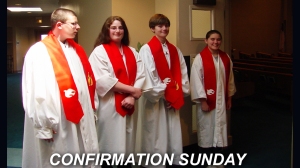 On this confirmation Sunday we celebrate the choice our confirmands have made to affirm their willingness to follow in the way of Jesus and take their place as adult participants in the community of faith. And my prayer for them today parallels the prayer Paul offered up for those early Christians in the City of Colossae: “Be assured that we haven’t stopped praying for you, asking God to give you wise minds and spirits attuned to God’s will, and so acquire a thorough understanding of the ways in which God works. As you learn more and more how God works, you will learn how to do your work. We pray that you’ll have the strength to stick it out over the long haul — not the grim strength of gritting your teeth but the glory-strength God gives. It is strength that endures the unendurable and spills over into joy, thanking God who makes us strong enough to take part in everything bright and beautiful.”
On this confirmation Sunday we celebrate the choice our confirmands have made to affirm their willingness to follow in the way of Jesus and take their place as adult participants in the community of faith. And my prayer for them today parallels the prayer Paul offered up for those early Christians in the City of Colossae: “Be assured that we haven’t stopped praying for you, asking God to give you wise minds and spirits attuned to God’s will, and so acquire a thorough understanding of the ways in which God works. As you learn more and more how God works, you will learn how to do your work. We pray that you’ll have the strength to stick it out over the long haul — not the grim strength of gritting your teeth but the glory-strength God gives. It is strength that endures the unendurable and spills over into joy, thanking God who makes us strong enough to take part in everything bright and beautiful.”
SLIDE 4: INCLUSIVE OF ALL
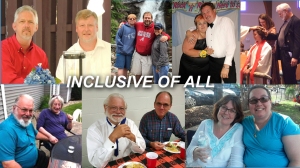 Paul’s prayer is really for all of us, because today we celebrate the covenant relationship that forms the United Church of Huntsville. Our foundation is in our Mission Statement: The United Church of Huntsville is inclusive to all. We strive to humbly walk the path of Jesus and to show love and justice in our church and in the world around us. No matter who you are or where you are on life’s journey you are welcome at the United Church of Huntsville. Everyone is welcome at the Sharing Table of Jesus. So one of the ways God is at work in each one of us and in our fellowship is through radical hospitality, seeking to include all people regardless of race, gender, sexual orientation, socio-economic status, educational level, and theology.
Paul’s prayer is really for all of us, because today we celebrate the covenant relationship that forms the United Church of Huntsville. Our foundation is in our Mission Statement: The United Church of Huntsville is inclusive to all. We strive to humbly walk the path of Jesus and to show love and justice in our church and in the world around us. No matter who you are or where you are on life’s journey you are welcome at the United Church of Huntsville. Everyone is welcome at the Sharing Table of Jesus. So one of the ways God is at work in each one of us and in our fellowship is through radical hospitality, seeking to include all people regardless of race, gender, sexual orientation, socio-economic status, educational level, and theology.
SLIDE 5: DISAGREE IN LOVE
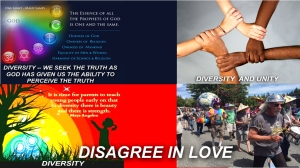 Our confirmands had a powerful example of how we seek to be inclusive by embracing a non-doctrinal fellowship. At the Sharing Table we asked all of the adults as well as the confirmands to fill out the Great Questions Questionnaire, and then we spent two Thursday evenings asking everyone at the table to share their answers. Needless to say at United Church wherever two people are gathered there are three opinions. And so we discovered that even though we disagree about our statements of belief, we are still able to live together in a spiritual fellowship that seeks to follow the way of Jesus together. As a witness to our diversity of belief, Evan and Cole will read their Statements of Faith as part of their confirmation, and their joining our fellowship.
Our confirmands had a powerful example of how we seek to be inclusive by embracing a non-doctrinal fellowship. At the Sharing Table we asked all of the adults as well as the confirmands to fill out the Great Questions Questionnaire, and then we spent two Thursday evenings asking everyone at the table to share their answers. Needless to say at United Church wherever two people are gathered there are three opinions. And so we discovered that even though we disagree about our statements of belief, we are still able to live together in a spiritual fellowship that seeks to follow the way of Jesus together. As a witness to our diversity of belief, Evan and Cole will read their Statements of Faith as part of their confirmation, and their joining our fellowship.
SLIDE 6: REPAIRING THE WORLD
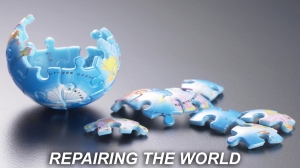 Why do we study Holy Scriptures, come to worship, engage in mission, and pray with and for each other? Because as we learn more about how God works, we learn more about how to do our work. One of the purposes of confirmation is to help young people to begin to identify how they might use their gifts and talents to serve God. During our sharing about the Great Questions Questionnaire we did discover one remarkable convergence of thought. Stewardship, using the gifts God has given to us to help repair the world – in Hebrew Tikkum Olam. It is my prayer that both Evan and Cole will find their own unique contributions they can make to the repair of the world.
Why do we study Holy Scriptures, come to worship, engage in mission, and pray with and for each other? Because as we learn more about how God works, we learn more about how to do our work. One of the purposes of confirmation is to help young people to begin to identify how they might use their gifts and talents to serve God. During our sharing about the Great Questions Questionnaire we did discover one remarkable convergence of thought. Stewardship, using the gifts God has given to us to help repair the world – in Hebrew Tikkum Olam. It is my prayer that both Evan and Cole will find their own unique contributions they can make to the repair of the world.
SLIDE 7: THE STAR THROWER
On this subject of repairing the world the Monday Bible Study has been reading The Star Thrower by Loren Eiseley. The story that gave the book its title speaks to repairing the world.
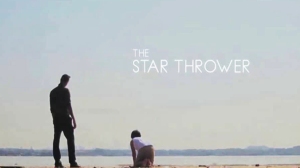 Loren Eiseley would go to the ocean to do his writing. He had a habit of walking on the beach before he began his work. One day he was walking along the shore. As he looked down the beach, he saw a human figure moving like a dancer. He smiled to himself to think of someone who would dance to the day. So he began to walk faster to catch up. As he got closer, he saw that it was a young man and the young man wasn’t dancing, but instead he was reaching down to the sand, picking up something and very gently throwing it into the ocean.
Loren Eiseley would go to the ocean to do his writing. He had a habit of walking on the beach before he began his work. One day he was walking along the shore. As he looked down the beach, he saw a human figure moving like a dancer. He smiled to himself to think of someone who would dance to the day. So he began to walk faster to catch up. As he got closer, he saw that it was a young man and the young man wasn’t dancing, but instead he was reaching down to the sand, picking up something and very gently throwing it into the ocean.
As he got closer, he called out, “Good morning! What are you doing?” The young man paused, looked up and replied, “Throwing starfish back into the ocean.”
“I guess I should have asked, ‘Why are you throwing starfish into the ocean?’”
“The sun is up and the tide is going out. And if I don’t throw them in they’ll die.”
“But young man, don’t you realize that there are miles and miles of beach and starfish all along it. You can’t possibly make a difference!”
The young man listened politely. Then bent down, picked up another starfish and threw it into the sea, past the breaking waves. “It made a difference for that one!”
SLIDE 8: VOCATION — WHERE YOUR DEEP GLADNESS & THE WORLD’S DEEP HUNGER MEET
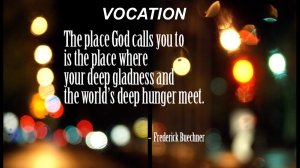 And that reminds me of a favorite quotation from Frederick Buechner about finding your niche in the world: “Vocation,” he wrote, “comes from the Latin word vocare (to call) and means the work a person is called to by God. There are all different kinds of voices calling you to all different kinds of work, and the problem is to find out which is the voice of God rather than of society, say, or the superego, or self-interest. The kind of work God usually calls you to is the kind of work (a) that you need to do and (b) that the world needs to have done. If you enjoy your work, you have presumably met requirement (a), but if your work is writing television deodorant commercials, the chances are you have missed requirement (b). On the other hand, if your work is serving as a doctor in a leper colony, you have probably met requirement (b), but if most of the time you are unhappy and depressed, the chances are you have not only bypassed (a) but you probably aren’t helping any of your patients either. Neither the hair shirt nor the soft berth will do. The place God calls you to is the place where your deep gladness and the world’s deep hunger meet.“
And that reminds me of a favorite quotation from Frederick Buechner about finding your niche in the world: “Vocation,” he wrote, “comes from the Latin word vocare (to call) and means the work a person is called to by God. There are all different kinds of voices calling you to all different kinds of work, and the problem is to find out which is the voice of God rather than of society, say, or the superego, or self-interest. The kind of work God usually calls you to is the kind of work (a) that you need to do and (b) that the world needs to have done. If you enjoy your work, you have presumably met requirement (a), but if your work is writing television deodorant commercials, the chances are you have missed requirement (b). On the other hand, if your work is serving as a doctor in a leper colony, you have probably met requirement (b), but if most of the time you are unhappy and depressed, the chances are you have not only bypassed (a) but you probably aren’t helping any of your patients either. Neither the hair shirt nor the soft berth will do. The place God calls you to is the place where your deep gladness and the world’s deep hunger meet.“
SLIDE 9: SERVING IN THE LIFE OF THE CHURCH
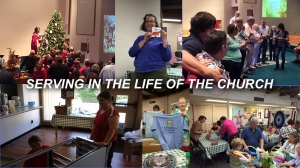 Today, not only are we confirming two young people, but we will also be electing new officers for our congregation. Part of our call to repair the world is to give our time and talents in the life of the congregation. The congregation has a unique mission in the life of the Tennessee Valley to help others see that we follow in the way of Jesus by creating and sustaining an inclusive community of faith.
Today, not only are we confirming two young people, but we will also be electing new officers for our congregation. Part of our call to repair the world is to give our time and talents in the life of the congregation. The congregation has a unique mission in the life of the Tennessee Valley to help others see that we follow in the way of Jesus by creating and sustaining an inclusive community of faith.
SLIDE 10: JOY FOR THESE CONFIRMANDS
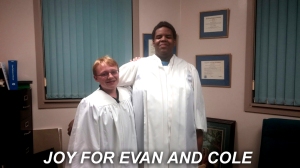 And this brings me to the last part of Paul’s prayer. “We pray that you’ll have the strength to stick it out over the long haul — not the grim strength of gritting your teeth and gutting it out, but the glory-strength God gives. It is strength that endures the unendurable and spills over into joy, thanking God who makes us strong enough to take part in everything bright and beautiful.” And after forty-one gutting it out in ministry, I’m not proud of some of my life, but coming now to my last confirmation class with joy I offer prayers of thanksgiving with their parents and the rest of this congregation that God will see them through to become responsible adults.
And this brings me to the last part of Paul’s prayer. “We pray that you’ll have the strength to stick it out over the long haul — not the grim strength of gritting your teeth and gutting it out, but the glory-strength God gives. It is strength that endures the unendurable and spills over into joy, thanking God who makes us strong enough to take part in everything bright and beautiful.” And after forty-one gutting it out in ministry, I’m not proud of some of my life, but coming now to my last confirmation class with joy I offer prayers of thanksgiving with their parents and the rest of this congregation that God will see them through to become responsible adults.
SLIDE 11: NO HALLOWEEN GOD
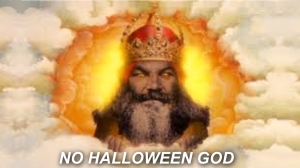 So, look for the joy! God doesn’t need any more long faced fun killing gloomy Christians. Jesus laughed because God laughs. Jesus told jokes. Jesus enjoyed life so much, they called him a party animal. It’s time to put away the Halloween images of God, angry, vengeful, scary, ready to zap unbelievers and anyone who transgresses even the minutest portion of the law.
So, look for the joy! God doesn’t need any more long faced fun killing gloomy Christians. Jesus laughed because God laughs. Jesus told jokes. Jesus enjoyed life so much, they called him a party animal. It’s time to put away the Halloween images of God, angry, vengeful, scary, ready to zap unbelievers and anyone who transgresses even the minutest portion of the law.
SLIDE 13: ROWDY CHRISTIANS
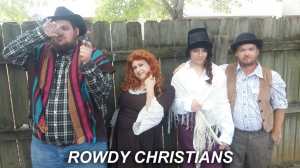 No God wants rowdy Christians, who enjoy life, who have a smiles on their faces and a ready laugh, who are ready to forgive others, because they know what it means to be forgiven — often.
No God wants rowdy Christians, who enjoy life, who have a smiles on their faces and a ready laugh, who are ready to forgive others, because they know what it means to be forgiven — often.
Today let’s celebrate Evan and Cole’s confirmation as they take their place in our community of faith, as we elect new leadership for the challenges that lie ahead.
Infinite Possibilities
Posted: November 13, 2016 Filed under: Uncategorized Leave a commentInfinite Possibilities
SLIDE 3: HEALING AFTER THE ELECTION
 We have just finished one of the most bizarre election cycles in American political history. The electioneering was no holds barred, sink as low as you can go, conjuring up hate filled images inciting fear and division. Now that the voting is over we have a long way to go to put our nation back together again. We have a President and congress that will have to govern and they might not get along with each other. And we might wonder how long our government can continue without finding some common ground for addressing major issues like the budget, the national debt, climate change, health care and employment.
We have just finished one of the most bizarre election cycles in American political history. The electioneering was no holds barred, sink as low as you can go, conjuring up hate filled images inciting fear and division. Now that the voting is over we have a long way to go to put our nation back together again. We have a President and congress that will have to govern and they might not get along with each other. And we might wonder how long our government can continue without finding some common ground for addressing major issues like the budget, the national debt, climate change, health care and employment.
SLIDE 4: NEW JERUSALEM
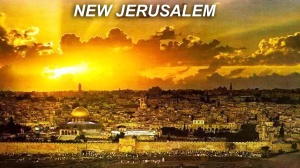 On this Sunday after election-day the lectionary lifts up the 65th chapter of the prophet Isaiah. This passage is drawn from the portion of the text that is commonly referred to as Third Isaiah, probably written by an unknown author after Babylon had been conquered by the Persians, and Cyrus had allowed the Jews to return to Israel. This prophet was writing to inspire Jews to return and rebuild Jerusalem holding out the promise of a new and Holy City that would be blessed by God:
On this Sunday after election-day the lectionary lifts up the 65th chapter of the prophet Isaiah. This passage is drawn from the portion of the text that is commonly referred to as Third Isaiah, probably written by an unknown author after Babylon had been conquered by the Persians, and Cyrus had allowed the Jews to return to Israel. This prophet was writing to inspire Jews to return and rebuild Jerusalem holding out the promise of a new and Holy City that would be blessed by God:
I’m creating new heavens and a new earth. All the earlier troubles, chaos, and pain are things of the past, to be forgotten. Look ahead with joy. Anticipate what I’m creating: I’ll create Jerusalem as sheer joy, create my people as pure delight. I’ll take joy in Jerusalem, take delight in my people: No more sounds of weeping in the city, no cries of anguish; No more babies dying in the cradle, or old people who don’t enjoy a full lifetime; One-hundredth birthdays will be considered normal — anything less will seem like a disappointment.
SLIDE 5: VISION OF INFINITE POSSIBILITIES
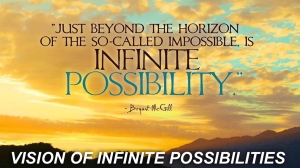 Of course this vision of a New Jerusalem is an ideal, a hope, some would say a pipe dream. But maybe what we need right now in the wake of this most recent election is an infusion of hope a reclaiming of our nation as a people of infinite possibilities. Who would have believed when John Kennedy announced we would put a man on the moon by the end of the decade that our nation would actually accomplish that goal, and Huntsville of all places would play a major role in making that pipe dream happen?
Of course this vision of a New Jerusalem is an ideal, a hope, some would say a pipe dream. But maybe what we need right now in the wake of this most recent election is an infusion of hope a reclaiming of our nation as a people of infinite possibilities. Who would have believed when John Kennedy announced we would put a man on the moon by the end of the decade that our nation would actually accomplish that goal, and Huntsville of all places would play a major role in making that pipe dream happen?
SLIDE 6: INFINITE POSSIBILITIES IF GOD IS STILL SPEAKING
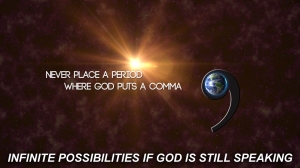 So let me invite you today to consider some infinite possibilities for our nation based on the values we are developing in this congregation at the Sharing Table. Like our Pilgrim ancestors, who sailed across the Atlantic seeking to create a New Jerusalem in the Wilderness of America, we lift up the words of the Pilgrim Pastor John Robinson, “Do not rely upon ancient formulations of faith and truth, for God has yet more light and truth to break forth from His Holy Word.” One of the values we can embrace that can open up infinite possibilities for our nation is “God is still speaking.” We are not stuck with a fundamentalist interpretation of any sacred texts, whether it is the Torah, the Quran, the Bhagavad Gita, the Sutras, or the New Testament. God is still speaking and for those who cultivate an open mind, new understandings of the divine will open up as we learn to live together and respect each other – all faiths living together in peace.
So let me invite you today to consider some infinite possibilities for our nation based on the values we are developing in this congregation at the Sharing Table. Like our Pilgrim ancestors, who sailed across the Atlantic seeking to create a New Jerusalem in the Wilderness of America, we lift up the words of the Pilgrim Pastor John Robinson, “Do not rely upon ancient formulations of faith and truth, for God has yet more light and truth to break forth from His Holy Word.” One of the values we can embrace that can open up infinite possibilities for our nation is “God is still speaking.” We are not stuck with a fundamentalist interpretation of any sacred texts, whether it is the Torah, the Quran, the Bhagavad Gita, the Sutras, or the New Testament. God is still speaking and for those who cultivate an open mind, new understandings of the divine will open up as we learn to live together and respect each other – all faiths living together in peace.
SLIDE 7: DISAGREE PEACEFULLY
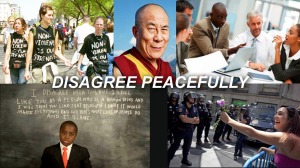 We don’t all have to agree. Indeed at the Sharing Table of Jesus wherever two are gathered there will be three opinions. We proved that for our confirmands, when we all shared our answers to the Great Questions Questionnaire. On many of the questions people chose radically different answers, and some folks even wrote their own unique answers to the question. But even when we disagreed, we disagreed without bullying or threatening one another, and we can still live in peace, embracing one another as part of the same spiritual fellowship.
We don’t all have to agree. Indeed at the Sharing Table of Jesus wherever two are gathered there will be three opinions. We proved that for our confirmands, when we all shared our answers to the Great Questions Questionnaire. On many of the questions people chose radically different answers, and some folks even wrote their own unique answers to the question. But even when we disagreed, we disagreed without bullying or threatening one another, and we can still live in peace, embracing one another as part of the same spiritual fellowship.
SLIDE 8: REOPENING OUR CULTURE TO SCIENCE
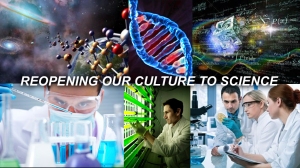 By embracing God is still speaking we can reopen our culture to science. The religious right has spent so much time and energy denying science, even vilifying scientific inquiry that our nation has begun to lag in scientific and technological achievement. Infinite possibilities open up, when we begin to apply science to our modern problems like climate change and green energy. We can also encourage further exploration in outer space and under the sea. Exploring space costs money, but think of all the benefits we realized by sending astronauts to the moon. We invented computers, made incredible breakthroughs in materials science, advanced meteorology, mapping of the earth, GPS satellites and communications. All because we dared to invest in scientific discovery, that repaid the investment many times over.
By embracing God is still speaking we can reopen our culture to science. The religious right has spent so much time and energy denying science, even vilifying scientific inquiry that our nation has begun to lag in scientific and technological achievement. Infinite possibilities open up, when we begin to apply science to our modern problems like climate change and green energy. We can also encourage further exploration in outer space and under the sea. Exploring space costs money, but think of all the benefits we realized by sending astronauts to the moon. We invented computers, made incredible breakthroughs in materials science, advanced meteorology, mapping of the earth, GPS satellites and communications. All because we dared to invest in scientific discovery, that repaid the investment many times over.
SLIDE 9: REACH OUT TO EXPLORE AND DISCOVER
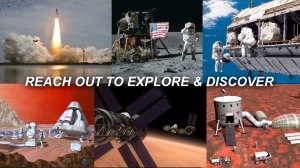 We need to begin boldly going where human beings have never gone before again, because that is who we are. The human spirit seeks to reach out to explore and discover. We need a quest for new knowledge and achievement beyond the accumulation of money and power. God has planted in the human heart the desire to reach into the great beyond, and as we pursue that immense journey we will find answers to many of our problems.
We need to begin boldly going where human beings have never gone before again, because that is who we are. The human spirit seeks to reach out to explore and discover. We need a quest for new knowledge and achievement beyond the accumulation of money and power. God has planted in the human heart the desire to reach into the great beyond, and as we pursue that immense journey we will find answers to many of our problems.
SLIDE 10: COMMUNITY OF AFFIRMATION
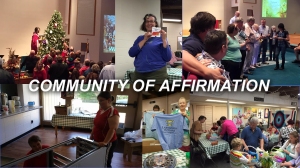 At the Sharing Table of Jesus no matter who we are, or where we are on life’s journey, we are welcome here! We are a community of affirmation. We do not practice discrimination on the basis of race, ethnic origin, gender, sexual orientation, income, or culture, we even seek accessibility for persons with disabilities – we welcome everyone. We do not make fun of people with disabilities. We do not engage in gay bashing, race baiting or behaviors supporting any form of racial supremacy. As a result we are becoming a community of healing – the kind of healing our nation needs right now!
At the Sharing Table of Jesus no matter who we are, or where we are on life’s journey, we are welcome here! We are a community of affirmation. We do not practice discrimination on the basis of race, ethnic origin, gender, sexual orientation, income, or culture, we even seek accessibility for persons with disabilities – we welcome everyone. We do not make fun of people with disabilities. We do not engage in gay bashing, race baiting or behaviors supporting any form of racial supremacy. As a result we are becoming a community of healing – the kind of healing our nation needs right now!
SLIDE 11: HEALING GRACE OF GOD
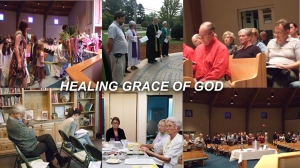 We can reach out into our community with our unique message of openness and affirmation and invite others to come to the Sharing Table and experience the healing grace of God. We can offer encouragement that God knows many of us are struggling. We do live in a difficult economy, where corporations and businesses don’t care about employees. We need to know we have good spiritual friends who stand with us as we struggle to earn a living. Friends who pray with us and for us when we are unemployed, sick, wrestling with addiction or other mental health issues. Here at the Sharing Table there is no shame, if we are struggling with depression, or anxiety, or relationship issues, because we acknowledge we are a community of imperfect people. We know that none of us is in a position to judge, and we even are so bold to claim that God does not judge, God simply loves us. Every once in while God may pick us up by the scruff of the neck and ask us, “How is that working for you?” But God and this community only seek to help, to love never to shame or condemn.
We can reach out into our community with our unique message of openness and affirmation and invite others to come to the Sharing Table and experience the healing grace of God. We can offer encouragement that God knows many of us are struggling. We do live in a difficult economy, where corporations and businesses don’t care about employees. We need to know we have good spiritual friends who stand with us as we struggle to earn a living. Friends who pray with us and for us when we are unemployed, sick, wrestling with addiction or other mental health issues. Here at the Sharing Table there is no shame, if we are struggling with depression, or anxiety, or relationship issues, because we acknowledge we are a community of imperfect people. We know that none of us is in a position to judge, and we even are so bold to claim that God does not judge, God simply loves us. Every once in while God may pick us up by the scruff of the neck and ask us, “How is that working for you?” But God and this community only seek to help, to love never to shame or condemn.
SLIDE 12: SHARING
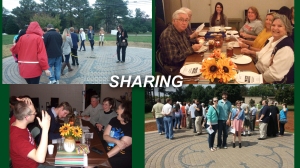 Another value of the Sharing Table that can open up infinite possibilities is sharing. When we share with one another both spiritually and materially miracles begin to happen. Especially when we can overcome our fears of sharing our spiritual neediness with others, we can begin to pray with and for each other, and miracles begin to happen.
Another value of the Sharing Table that can open up infinite possibilities is sharing. When we share with one another both spiritually and materially miracles begin to happen. Especially when we can overcome our fears of sharing our spiritual neediness with others, we can begin to pray with and for each other, and miracles begin to happen.
SLIDE 13: MIRACLES OF HEALTH AND WELL BEING
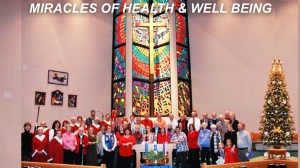 These are not zap the rabbit out of the hat kind of miracles. No, the wonders that happen at the Sharing Table are small quiet events, where faith intersects with healing to overcome fear and doubt to support health and wellbeing. And perhaps the most important miracle of all is when we develop good spiritual friends we know that we don’t ever have to feel like we are abandoned or alone. Each of us may have to face challenges, with our jobs, our children, our finances, our health, and eventually each one of us will face death. But we don’t have to bear our burdens alone. God gives us good spiritual friends at the Sharing Table who will pray with us, and for us, help to hold us accountable, who will sit with us when we are in grief and support us when we are hurting. And so allow me to close with the Statement of Faith of the United Church of Canada selection number 887 in your hymnal a statement of our infinite possibilities at the Sharing Table:
These are not zap the rabbit out of the hat kind of miracles. No, the wonders that happen at the Sharing Table are small quiet events, where faith intersects with healing to overcome fear and doubt to support health and wellbeing. And perhaps the most important miracle of all is when we develop good spiritual friends we know that we don’t ever have to feel like we are abandoned or alone. Each of us may have to face challenges, with our jobs, our children, our finances, our health, and eventually each one of us will face death. But we don’t have to bear our burdens alone. God gives us good spiritual friends at the Sharing Table who will pray with us, and for us, help to hold us accountable, who will sit with us when we are in grief and support us when we are hurting. And so allow me to close with the Statement of Faith of the United Church of Canada selection number 887 in your hymnal a statement of our infinite possibilities at the Sharing Table:
SLIDE 14: GOD IS WITH US. WE ARE NOT ALONE. THANKS BE TO GOD!
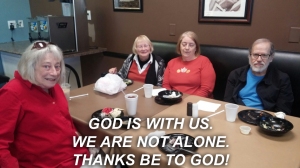 We are not alone, we live in God’s world.
We are not alone, we live in God’s world.
We believe in God: who has created and is creating, who has come in Jesus, the Word made flesh, to reconcile and make new, who works in us and others by the Spirit.
We trust in God.
We are called to be the Church: to celebrate God’s presence, to live with respect in Creation, to love and serve others, to seek justice and resist evil, to proclaim Jesus, crucified and risen, our judge and our hope.
In life, in death, in life beyond death, God is with us. We are not alone.
Thanks be to God.
Recent Comments